The head of CSIS -- Canadian Security Intelligence Service,
revealed details about foreign government espionage
on Canadian soil involving Canadian politicians.
Richard Fadden said that Cabinet Ministers in two provinces
are under control of foreign governments --
which in espionage circles are called
"agents of influence" or "secret supporters".
So are several members of British Columbia municipal governments.
At least 5 foreign countries are surrepticioulsy recruiting future political prospects --
China the most aggressively.
CHINA IN CANADA WARNS SPY CHIEF
"I'm making this comment because
I think it's a real danger that people be totally oblivious to this kind of issue....
I think there are a number of countries around the world that have
...quite aggressive intelligence relationships against us.
A goodly number of countries use every tool at their disposal
from diplomacy to spying.
My message would be that we need to be aware of this possibility."
~ Richard Fadden, Director of CSIS
Ten months ago [January 2010] a massive statue of Russia's and China's communist tyrants -- Lenin and Mao -- was erected in Vancouver, British Columbia, Canada.revealed details about foreign government espionage
on Canadian soil involving Canadian politicians.
Richard Fadden said that Cabinet Ministers in two provinces
are under control of foreign governments --
which in espionage circles are called
"agents of influence" or "secret supporters".
So are several members of British Columbia municipal governments.
At least 5 foreign countries are surrepticioulsy recruiting future political prospects --
China the most aggressively.
CHINA IN CANADA WARNS SPY CHIEF
"I'm making this comment because
I think it's a real danger that people be totally oblivious to this kind of issue....
I think there are a number of countries around the world that have
...quite aggressive intelligence relationships against us.
A goodly number of countries use every tool at their disposal
from diplomacy to spying.
My message would be that we need to be aware of this possibility."
~ Richard Fadden, Director of CSIS
There was public protest at the time but the politicians involved refused demands for its removal and it's still there, symbolically spitting in Canada's face. SeeCANADA COMMIE LENIN-MAO STATUE & LENIN-MAO MOCK CANADA OLYMPICS
Then four months ago [June 2010] the head of Canada's spy agency, CSIS (the equivalent of Britain's MI6 and USA's CIA) caused a national uproar by saying, live on TV, that foreign governments - including China - had infiltrated the Canadian government and were influencing politicians at all levels.

watch CSIS Director Richard Fadden Interview YouTube
CBC-TV, June 22, 2010
~ end quoting CBC interview ~
Politicians from all stripes - including the Prime Minister and Premiers from all ten provinces either refused to comment or if they did pled innocence or ignorance regarding what the spy chief was talking about.Some politicians and the so-called "Chinese Community", comprised of over a million Chinese who have immigrated here from Communist China, demanded the resignation or firing of Canada's spy chief.

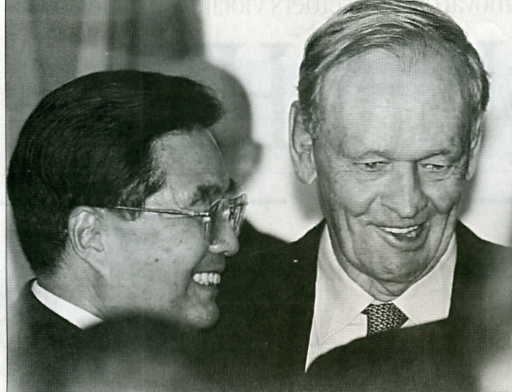
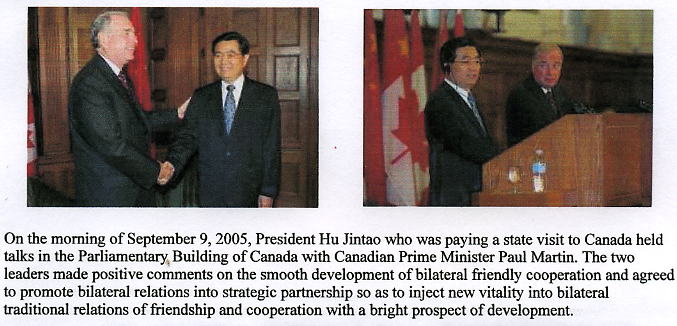
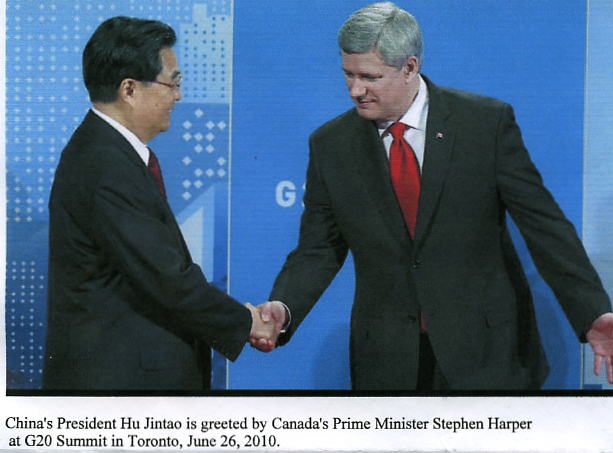
Foreign powers control Canada politicians, Telegraph, Jun 23, 2010
The comments by Richard Fadden, the director of the Canadian Security Intelligence Service, in a television interview have been widely interpreted as a thinly-veiled attack on Beijing on the eve of a visit to Canada by the Chinese president Hu Jintao for the G20 summit. Mr Fadden told CBC that municipal officials and at least two cabinet ministers from two Canadian provinces were "agents of influence" who were secretly working on behalf of foreign interests. "We're in fact a bit worried in a couple of provinces that we have an indication that there's some political figures who have developed quite an attachment to foreign countries," he said. "The individual becomes in a position to make decisions that affect the country or the province or a municipality. All of a sudden, decisions aren't taken on the basis of the public good but on the basis of another country's preoccupations."
For many Canadians, Mr Fadden did not have to name names for them to work out which to which foreign country he was referring. As elsewhere, China has been linked with economic espionage in Canada, most recently over reports that its technicians had tried to steal secrets from the aerospace company Bombadier. Tung Chan, a former Vancouver city councillor and head of an immigrant services organisation, said Mr Fadden's remarks "cast shadows and cast doubts on the loyalty of a whole group of people, particularly those committed to serve the public". He added: "It's not helpful to what we're trying to do in creating multicultural harmony." He was echoed by several members of the Chinese-Canadian community, as well as provincial premiers and city mayors..... See REMEMBER WHO HU IS
But CSIS-boss Fadden refused to resign and a couple weeks later he reitereated his statements before a parliamentay committee in the House of Commons. He even provided a report naming names and countries involved. But the public will never see the report because the government blacked out all the identifying information citing "national security", a euphemism for "politician protection".
Canadian Security Intelligence Service director Richard Fadden says he has no intention of resigning after facing mounting criticism for his candid interview with CBC News in June. The House of Commons public safety and national intelligence committee reconvened for a rare summer sitting to question Fadden. During a two-hour grilling, Fadden told the committee that it's "good public policy" for Canadians to be more informed about "foreign interference" threats. "My comments did not in any way threaten national security," he told the public safety committee regarding his suggestion that some Canadian politicians are being influenced by foreign governments.... The CSIS head was called to the specially convened House of Commons committee session to answer questions about his comments in a CBC News interview that aired last month, just as world leaders began arriving for the G8/G20 summits. Fadden told the committee he will name the politicians CSIS is concerned about, but only to the minister to whom he reports. In a statement issued after Fadden's testimony, Public Safety Minister Vic Toews said he has no comment, noting that [CSIS director] Fadden's testimony speaks for itself. During the CBC interview, Fadden also said the agency [CSIS] was in the process of discussing with the Privy Council Office the best way to inform the provinces of concern that there may be a problem. ThePrime Minister's Office [Stephen Harper] later issued a statement saying it had "no knowledge of these matters"....
~ end quoting CBC article ~
Since that time spy-chief Fadden has seemingly become a "refs unperson" as in Orwell's "1984" where: "People who had incurred the displeasure of the Partysimply disappeared and were never heard of again. Their name was removed from the registers. Every record of everything they had ever done was wiped out, their one-time existence was denied and then forgotten. They were abolished, annihilated: vaporized was the usual word. One never had the smallest clue as to what had happened to them. The only real clue lay in the words 'refs unperson', which indicated that the person was dead. He did not exist: he had never existed".Then a couple of weeks ago [October 2010] a Chinese municipal politician in Vancouver - who calls himself "Chairman Chow" (after China's Chairman Mao) got cocky while sitting in for the absentee mayor (a descendent of Norman Bethune a Canadian communist honoured by Chairman Mao) and got some laughs from fellow councillors while mocking Canada's CSIS spy-chief:
City Hall's Chairman Chow, Vancouver Courier, Oct 13, 2010 (Vision Vancouver Councillor George Chow seemingly relished his duties chairing a special city hall meeting last week, dispatching one councillor to fill his mug and telling another he didn’t need a break. As faithful readers will recall, Chow and his Chowisms have filled up many a column of your dedicated city hall watcher. A summary: He loves K-cars, enjoys showing reporters photographs of himself doing roof repairs, knows an interesting urinal when he sees one (and supplied this scribe with a photograph), uses his excess water from his bath to flush his toilet, revealed he would walk on hot coals in Chinatown for a fundraiser (not sure if he did), is able to recite poetry from his childhood ("A pen and a man. A man and a pen. This is a pen. This is a man"), has a life-sized photograph of himself and claims he was named after King George. More recently, he sought inspiration from Confucius in a "prayer" he delivered at a July council meeting that poked fun at CSIS boss Richard Fadden and his allegations that unnamed municipal politicians in B.C. are on the take from foreign governments. So it was with great enthusiasm that I watched Chow as he chaired the Oct. 5 meeting of the transportation and traffic committee at city hall. Chairman Chow, anybody? The similarity of his title to the leader of the Chinese revolution -- some guy named Mao -- brought a smile to his face. It also brought giggles from some of his colleagues and those who showed up in the gallery to hear council's eventual decision to approve a separated bike lane on Hornby Street. Sitting at an elevated desk normally occupied by Mayor Gregor Robertson, which is flanked by large photographs of Queen Elizabeth and Prince Philip, Chow presided over the meeting like, well, an autocratic leader. In no particular order, he told Vision Vancouver Coun. Raymond Louie that he didn't need a break because he just had supper, he shook his empty cup at Vision Vancouver Councillor Tim Stevenson to fetch him some more hot water and was merciless in cutting off politicians and the public at the microphone. At one point, when the talk turned to lack of new road space available, Chow suggested a motion be introduced to find the engineer who designed the city's streets and subject that person to a public flogging. More laughs. He also mused out loud that if he dropped the C from his surname that he would be known as "Chairman How". I'm not sure anybody in the chambers understood what he meant, but there was laughter. But as Chairman Chow's old buddy Confucius once said, "Everything has beauty, but not everyone sees it." More teachings and comedy to come from Chairman Chow at the next transportation and traffic meeting, scheduled for November 2nd. A book of his quotations will be available in the lobby for signing. Just kidding... I think.
"Isn't it amazing?" laugh the Chinese hysterically in the statues down at English Bay in Vancouver, and now in the flesh at Vancouver's City Hall. See A-MAZE-ING LAUGHTER

"A-maze-ing Laughter" by Chinese artist Yue Minjun.
The larger-than-life, cast-bronze statues depict Minjun's own face in a state of hysterical laughter,
encouraging the viewer to share in his joy.
And let's face it -- every now and then, we all need a good chuckle.
CHINA'S INVISIBLE BLACK HAND & MONSTER MAO UNKNOWN STORY & CHINA FOODFIGHT FOR CANADA POTASH & LENIN-MAO MAN-MADE STARVATION
CHINA HOME ON CANADA'S RANGE & CHINA SPIES ON AMERICA & OZ PM SPIED FOR CHINA & CANADA'S RED TRUDEAU & CHINADA'S SOVIETIZATION & CHINESE TAKE-OVER AMERICA
35.Big Brother's Brotherhood & GOLDSTEIN CONSPIRACY IN 1984
watch JFK say USA won't trade with Red China
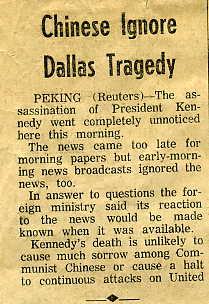
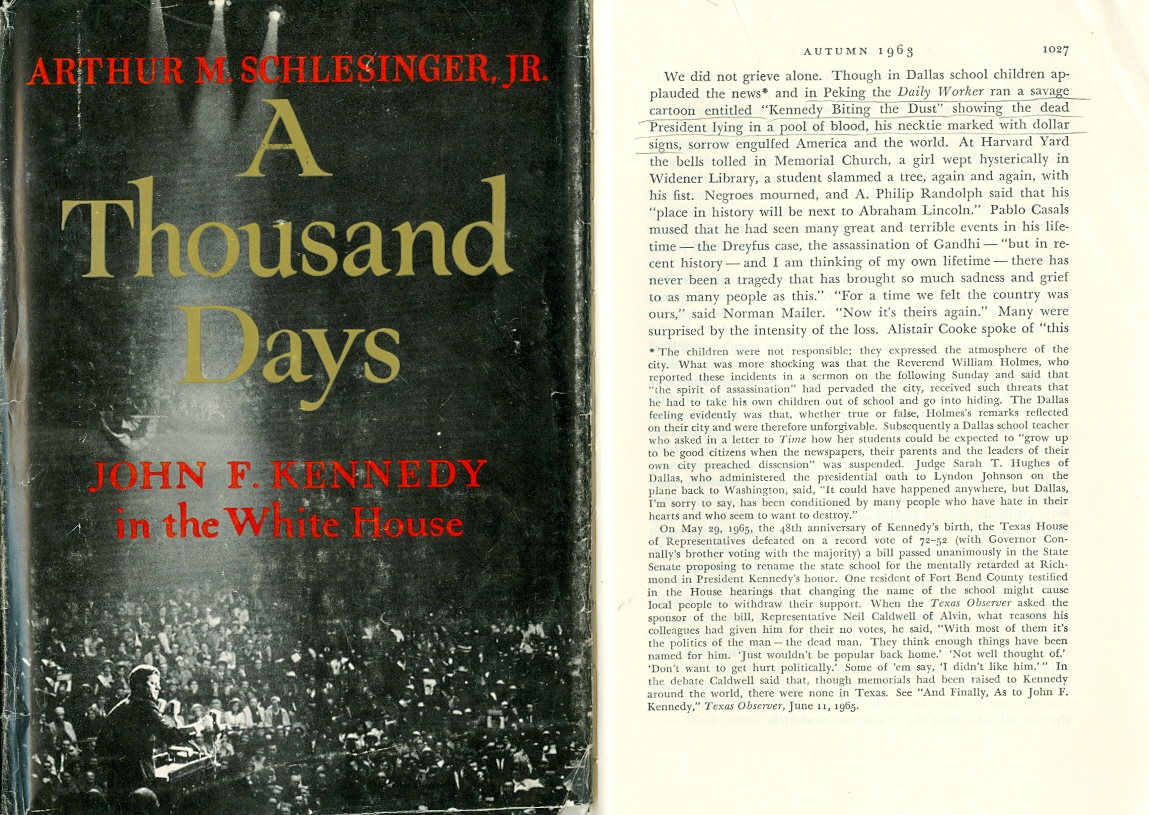
(JFK killed 8 days later/China laughed)
Chinese gov't propaganda in Canada schools

Chinese workers killing Canada middle class


(China-owned companies demand slave labour)
Canuck gov't OKs deal with commie Chinks
(secretly signed in Russia behind closed doors)

(gives Red China control of Canada resources)
CanNews, Sep/Oct 2014
CHINA IN CANADA WARNS SPY CHIEF
& CANADA'S RED TRUDEAU
& 35.Big Brother's Brotherhood
& 9.Keeping Masses Down
& ON JFK'S DEATH, CHINA & UN
Canada Feds quietly sign controversial Chinese trade pact (just weeks after the country was accused of a cyber attack on Canada)

(JFK killed 8 days later/China laughed)
Chinese gov't propaganda in Canada schools

Chinese workers killing Canada middle class


(China-owned companies demand slave labour)
Canuck gov't OKs deal with commie Chinks
(secretly signed in Russia behind closed doors)

(gives Red China control of Canada resources)
CanNews, Sep/Oct 2014
CHINA IN CANADA WARNS SPY CHIEF
& CANADA'S RED TRUDEAU
& 35.Big Brother's Brotherhood
& 9.Keeping Masses Down
& ON JFK'S DEATH, CHINA & UN
CanadianManufacturing, Sep 15, 2014
International Trade Minister Ed Fast announced late September 12 that the pact, known as FIPA, had been signed by Canada two years after its terms were first negotiated by the two countries... China is Canada's No 2 trading partner, and prime minister Harper is scheduled to visit Beijing in November for the annual APEC summit. The deal, however, has been met with suspicion and alarm not just by the government's usual critics, but by senior Conservative cabinet ministers too. Employment Minister Jason Kenney, for example, expressed misgivings about forging closer ties with China as recently as this spring. The government had failed to ratify FIPA amid a series of recent tensions in Canada-China relations. Earlier this summer, Prime Minister Harper accused the Chinese of a cyberattack on the National Research Council, while the Chinese claimed a Canadian couple living in China were spies. Late last month, a Chinese delegation led by assistant foreign minister Zheng Zeguang visited Ottawa to discuss the relationship with high-level Foreign Affairs personnel and Ray Novak, Harper's chief of staff. The failure to ratify FIPA was creating additional tensions between the two nations. Wenran Jiang, a China expert from the University of Alberta and director of the Canada-China Energy and Environment Forum, said the ratification will help thaw the icy relationship. "This is a major step by the Canadian government -- and to be more specific, by Prime Minister Harper himself and the cabinet -- to mend the fence prior to prime minister's November China trip", he said. Jiang added it will also help the prime minister plan a successful bilateral visit with his Chinese hosts during APEC, the prospects of which were dim until ratification. "The Canadian effort of approving FIPA at this exact moment is not accidental", he said. Canada has similar investment agreements with several other nations, including Russia, but has separate rules for investing for each country.... Opponents decry the agreements as part of a broader global corporate agenda that allows foreign companies to use binding arbitration to override Canadian laws in a range of areas -- including the environment and energy -- on the basis that they nullify the protections guaranteed in the deals....
*Symbolically, Vladisvostok -- the place in Russia where the Prime Minister of Canada signed the deal giving access/control/ownership of Canada's resources to Communist China -- was where the Communists assassinated the Czar and all his family. Watch The Execution of Tsar Nicholas II
Harper OKs potentially unconstitutional China-Canada FIPA deal (coming into force October 1)
by Jenny Uechi, VanObserver, Sep 12, 2014
It's official: Prime Minister Stephen Harper has approved the controversial Canada-China Foreign Investment Promotion and Protection Agreement (FIPA) today. In a short, two-paragraph news release, International Trade Minister Ed Fast said the deal was now ratified. It will come into force on October 1, 2014, and will be effective for 31 years, until 2045. The original investment protection deal -- which treaty law expert Gus Van Harten said could be in violation of the Canadian Constitution -- was quietly signed in 2012 in Vladisvostok, Russia, but was delayed for two years due to public outcry. Chinese companies can sue Canada: As FIPA comes into force, it would have a major impact on projects such as Enbridge Northern Gateway and potentially some LNG proposals. The deal would allow Chinese investors to sue British Columbia if it changed course on the Northern Gateway pipeline proposal. "It is true that Chinese investors can sue Canada for any actions by the federal government or the B.C. government (or legislature or courts) relating to Chinese assets connected to the [Enbridge] Northern Gateway pipeline," Van Harten said. "More troubling, there is no requirement in the treaty for the federal government to make public the fact of a Chinese investor's lawsuit against Canada until an award has been issued by a tribunal. This means that the federal government could settle the lawsuit, including by varying its conduct in a way that many Canadians would oppose, or by paying out public money before an award is issued, and we would never know."... Op-eds in publications such as The National Post said the China-Canada deal was too one-sided and gave too much power to China. Unlike NAFTA, the FIPA is not a trade deal and would not reduce tariffs for Canadian exports to the Chinese market.... Canada's third-largest oil company, Nexen, was bought by Chinese state-owned CNOOC in October 2012.... Although the Prime Minister has been silent on the deal, Trade Minister Ed Fast said in the news release that FIPA would benefit Canadians...
Chinese spies bugged future Canada Defense/Armed Forces buildings, CornwallisNews, Sep 30, 2013
Not really a good buy for Harper. The Harper government has just learned that the future headquarters of National Defense and the armed forces is plugged with electronic spy bugs placed there by Chinese spies there years ago when it was still a big Nortel industrial complex. The devices are hidden in the walls, the ceilings and even in the heating system. It could take years to find them all and the estimated cost to find every one of them is three-quarters of billion bucks! The former head of our Canadian spy agency Richard Fadden lost his CSIS job last spring after he announced publicly that Chinese computer hackers had been spying on our politicians. Now we find out he was bang on. Back in the days when the spy bugs went in, it was all about getting Nortel industrial secrets, not military secrets. Only now are we finding out. Despite contrary advice from electronic security experts -- and ironically even the new Minister of National Defence, Peter MacKay -- the Harper government went ahead and bought the entire Nortel complex for a pitance to house the Defense department. The price was right. Harper only paid $209 million for the entire property. It was only afterwards that Harper [Prime Minister] learned it was full of Chinese spy bugsand that it would cost an additional $790 million to clear out the bugs and prepare the building for the military and national defense. Not such a good buy at close to a billion bucks. Goodbye bargain. There are some of his ministers -- who prefer anonymity for the moment -- who wish Harper would find another site for national defense and let the Nortel buildings house departments that don’t have big military secrets to protect. Not a bad idea at all. Wait and see what Harper does. Spending us into another hole helps explain why Harper will be going deeper into debt in his next budget. Wait till next March to find out the numbers.
CSIS director Richard Fadden shuffled to Defence, CBC, Apr 22, 2013
Richard Fadden, the head of the Canadian Security Intelligence Service, is set to become deputy minister of Defence in a shuffle of the senior ranks of the public service announced Monday. The Prime Minister's Office says Fadden's transfer takes effect May 13/13. Michel Coulombe, currently deputy director of operations at the spy agency, will become interim director when Fadden leaves. Fadden has been head of CSIS since June 2009. He was the subject of some controversy in June 2010, when he said in an interview that foreign countries [China] were both conducting industrial espionage against Canada, and trying to influence Canadian politicians. Robert Fonberg, currently deputy minister at Defence, has been named a special adviser to the clerk of the Privy Council.
Communist China nationalizes Canada's oil sands

(PM allows Chinese CNOOC takeover Canadian Nexen)

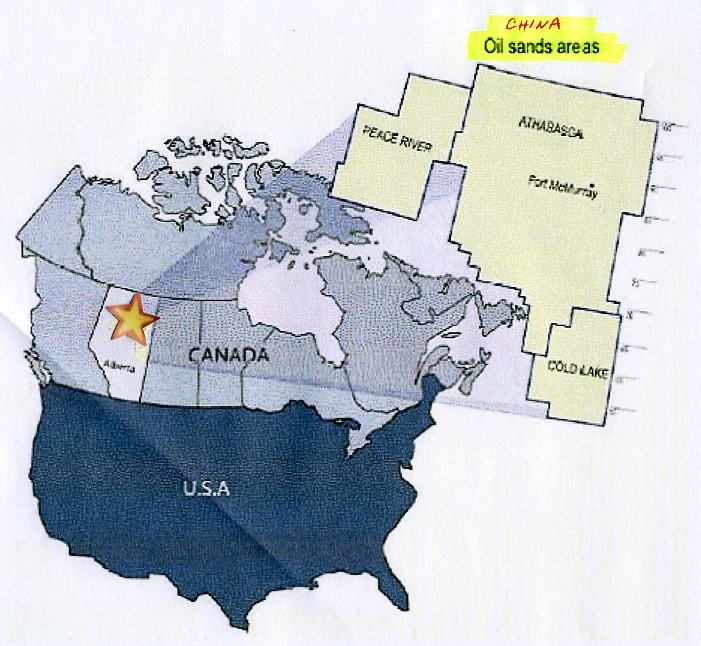

Spy Chief right that politicians in treason with Red China
watch CSIS Fadden says China influence Canada gov't
CanNews/YouTube, Jan 1, 2013
CHINA TALONS IN CANADA OIL SANDS
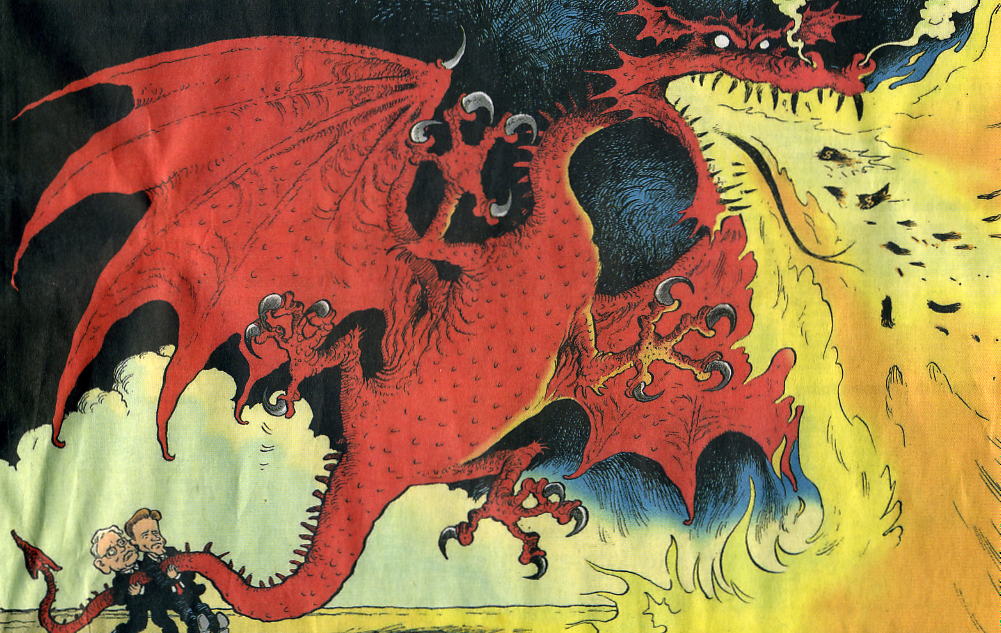

CHINA IN CANADA WARNS SPY CHIEF





GOLDSTEIN CONSPIRACY IN 1984
& JFK OPPOSED MONOLITHIC CONSPIRACY

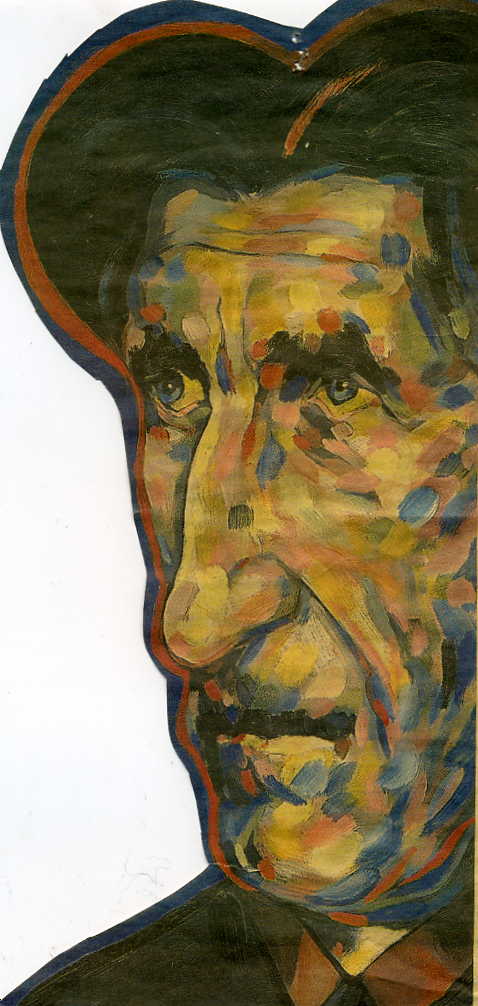
ORWELL ARCH-ENEMY OF MARX
listen JACKIE JURA INTERVIEW ALL ABOUT ORWELL
& 7.Systems & 35.Big Brother's Brotherhood
Judge deals rare rebuke to CSIS, refuses to grant wiretap on citizens, corporations
(PM allows Chinese CNOOC takeover Canadian Nexen)



Spy Chief right that politicians in treason with Red China
watch CSIS Fadden says China influence Canada gov't
CanNews/YouTube, Jan 1, 2013
CHINA TALONS IN CANADA OIL SANDS


CHINA IN CANADA WARNS SPY CHIEF





GOLDSTEIN CONSPIRACY IN 1984
& JFK OPPOSED MONOLITHIC CONSPIRACY

ORWELL ARCH-ENEMY OF MARX
listen JACKIE JURA INTERVIEW ALL ABOUT ORWELL
& 7.Systems & 35.Big Brother's Brotherhood
by Colin Freeze, GlobeMail, Dec 7, 2012
The federal spy service has been dealt a rare rebuke by a judge, who has rejected a CSIS bid to wiretap Canadian citizens or corporations allegedly in cahoots with suspicious foreigners. In a heavily censored Dec. 6 ruling touching on a Top Secret intelligence dossier, Madam Justice Anne Mactavish approved wiretaps against a network that is suspected of operating in Canada at the behest of an unspecified country. But she struck from the wiretap application the names of Canadian citizens or corporations associated with the network, ruling that their inclusion would be an overreach on civil liberties. It is extremely rare for the Federal Court to reject any such wiretap application. This ruling effectively makes it illegal for the Canadian Security Intelligence Service to directly target the network’s Canadian components, which are not identified...
The targets of the overarching warrants are anybody’s guess. CSIS director Richard Fadden has very publicly sounded the alarm about foreign agents of influence, particularly ones from China, growing too cozy with Canadian politicians. Mr. Atkey said CSIS’s laws could be broad enough to allow for the spy service to target anyone from Chinese or Russian diplomats to Palestinians running goods to Gaza – or even to American officials who might be trying to unduly influence energy policies. That’s because the low legal thresholds in Section 16 of the CSIS Act allow the spy service broad latitude to keep an eye on what foreigners are doing in Canada, provided cabinet ministers sign off on the spying activities. But there are limits. When the CSIS Act was debated in the early 1980s, critics feared these provisions led to a “hidden agenda†that would allow innocent third-party Canadians – for example, professors and journalists who dealt with Russia, which was then still a Cold War enemy – to be swept up in government eavesdropping dragnets. To address such fears, the law was crafted to protect Canadian citizens even if they might be associated with a group of foreign agents.... Canada has no criminal laws against undue foreign influence, even though other countries do. The United States, for example, routinely prosecutes individuals under its Foreign Agents Registration Act – a law that makes it illegal for foreigners to slyly shape U.S. policies at the behest of foreign entities.
Chinese "trade secret" cases show CSIS director Richard Fadden was right with his 2010 warning
Ottawa Citizen, Dec 4, 2012
Clearly, Richard Fadden is owed an apology. Fadden, you remember, is director of the Canadian Security and Intelligence Service. In 2010 he got himself in trouble after saying that CSIS suspected some Canadian public officials of working on behalf of foreign governments. Of course, Fadden didn’t need to name names or identify the countries involved. Everyone knew he was talking about communist China. Canadians acting on behalf of China were, in the words of one or the more intelligent commentators, “infiltrating Canadian politics and exerting influence over Canadian politicians.†Indeed, at least two of those suspected “agents of influence†held cabinet posts in provincial government, according to Fadden, and the problem is particularly conspicuous in British Columbia, the hot zone of Asian immigration in Canada. Oh the hue and cry that ensued. Editorialists were aghast, fearing that Fadden’s views would be used to undermine multicultural and immigration policies. (Well, like, duh. If multikultism is making it easier for others to spy on this country, then it only makes sense of reconsider those attitudes.)
Politicians likewise took great umbrage at the notion that any of them would act in a treasonous manner. But then, as one editorialist remarked, “the MPs were playing to the multicultural crowd.†Academics were also puzzled why Fadden would say what he said because there was no benefit to him for saying it. (I guess the idea of patriotism is beyond academic comprehension.) And, no surprise, those of the ethnic persuasion more or less brandished that shuts-down-all-discussion epithet of “racism†to scare everyone into silence. Never mind that Fadden was once the deputy minister of citizenship and immigration, and, no doubt, had some knowledge of how Canada’s immigration system is abused. All of this hostility might have been warranted if subsequent events didn’t provide considerable evidence to back Fadden’s claim. Scant days after he spoke out American authorities arrested Russian agents — some posing as Canadians – who were involved “in a plot to penetrate the innermost circles of American power.†A year later, in 2011, we had the so-called Dechert affair. Again, you surely remember the kerfuffle when Conservative MP Bob Dechert publicly apologized for his more-than-friendly relationship with Shi Rong, a Toronto correspondent for Xinhua, the Chinese state news agency. Everybody knows (except, it seems, Dechert) that Xinhua serves as an intelligence gathering arm for the Chinese government....
Prove China spy allegations or 'shut up', ambassador says, CBC, Nov 17, 2012
Beijing's representative in Ottawa says Chinese firms are not involved in foreign espionage and he challenges anyone who says otherwise to produce evidence or keep quiet, in a rare interview airing Saturday on CBC Radio's The House. Zhang Junsai, China's ambassador to Canada, tells host Evan Solomon, "I can assure you that our companies working in other countries are strictly doing business according to the local laws. If you really have the evidence, come [out] with it. If not... shut up", Zhang says in no uncertain terms. The Chinese ambassador's comments come on the heels of a scathing report released by a U.S. intelligence committee last month, warning of the security risks associated with doing business with two of China's leading telecommunications firms, Huawei and ZTE. The ambassador said "even the United States could not give out evidence." However, as CBC's Greg Weston reported days after the report was made public, that same U.S. intelligence committee has turned over to the FBI evidence of possible bribery and corruption by Huawei, one of the largest telecom companies in the world.
In an interview with CBC News after the U.S. report was released, the chairman of the committee, House Representative Mike Rogers, warned that Canada's national security was equally at risk. Zhang said the "so-called security concerns" are "so far, groundless". China's ambassador blamed the allegations of espionage against Chinese firms on "a Cold War mentality". But a controversial bid by a Chinese state-owned company has raised concerns about growing Chinese investment in Canada's natural resources. And while the federal government is reviewing a $15-billion proposed takeover by China National Offshore Oil Corp of Calgary's Nexen Inc under the Investment Canada Act, the Chinese ambassador told Solomon there's nothing to fear. "We're here not to grab your resources. We're here to participate", Zhang said, pointing to the fact that no oil or gas has been shipped from Canada to China yet. The Chinese ambassador said Canada was "one of the best destination" for Chinese companies to invest partly because of our "transparent policies". Official Opposition Leader Tom Mulcair has come out swinging against the deal, saying his New Democrats do not believe it's in Canada's best interest. Members of the Conservative caucus are also said to be grappling with the bid, as are a majority of Canadians, who recent surveys suggest are uncomfortable with a major domestic oil company being sold to a Chinese government enterprise.
The federal government, however, is apparently facing pressure from industry to approve the bid in exchange for further reciprocity from China. The review period has been extended to December 10, 2012. The Conservatives have also come under heavy scrutiny from opposition parties and critics who have sounded the alarm over an investment treaty Prime Minister Stephen Harper recently signed with China, saying Canada will come out on the losing end of the deal. Zhang brushed off the concerns, saying that China has signed similar investment treaties with more than a hundred countries and describing it as an "international standard agreement". The treaty, formally known as a Foreign Investment Promotion and Protection Agreement, could have been ratified via a cabinet decree as early as 21 sitting days after it was tabled in Parliament on September 26, 2012. But so far there's no indication on the federal government's website of orders-in-council that it has come into law. Zhang said building "mutual trust" between the two countries is a priority, adding that the economic and trading relations between the two countries are "very important". This week, Chinese Vice-President Xi Jinping succeeded outgoing President Hu Jintao as the country's new leader, assuming the top posts in the Communist Party. Zhang said political reform is "high" on the government and party's agenda.
Canada Spy agency CSIS warns of espionage risk with foreign takeovers, Toronto Star, Sep 21, 2012
Canada’s top spy is sounding the alarm over security threats facing Canada, including...state-owned corporations who snoop on Canadian business interests and cyber-attackers who attempt to hack the federal government’s computer network daily. Richard Fadden, director of the Canadian Security Intelligence Service used the agency’s annual report to issue a pointed warning about the potential risks posed by foreign state-owned companies. His message comes as the federal government is reviewing a proposal by CNOOC Ltd., a state-owned Chinese firm, to take over Calgary-based Nexen Inc., an oil-and-gas company. “Certain state-owned enterprises and private firms with close ties to their home governments have pursued opaque agendas orreceived clandestine intelligence support for their pursuits here,†Fadden says in the report which was released Thursday. “When foreign companieswith ties to foreign intelligence agencies or hostile governments seek to acquire control over strategic sectors of the Canadian economy, it can represent a threat to Canadian security interests.â€...
Canada oil interests not well protected, EdmontonJournal, Feb 20, 2012
...After taking a look at the likely outcomes of Harper's vision for trade with China - especially his goal of making it easier for China to gobble up an increasing share of bitumen from Alberta's oilsands - it's fair to ask, whose national interest is our prime minister really advancing: Canada's or China's?...State-owned oil companies such as Sinopec, the Chinese National Offshore Oil Company (CNOOC) and Petro China are not "free-market players" - they are owned by the Communist Party of China and are responsible for implementing Chinese national interests....
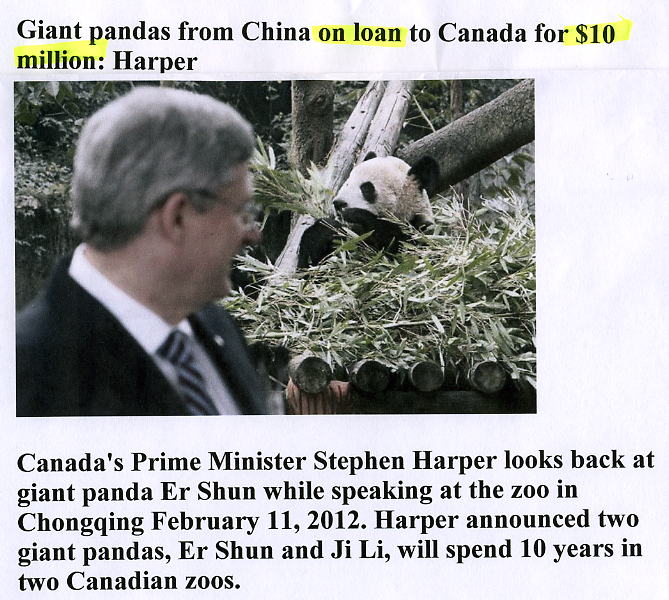
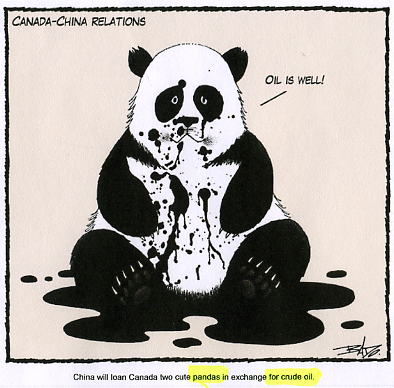
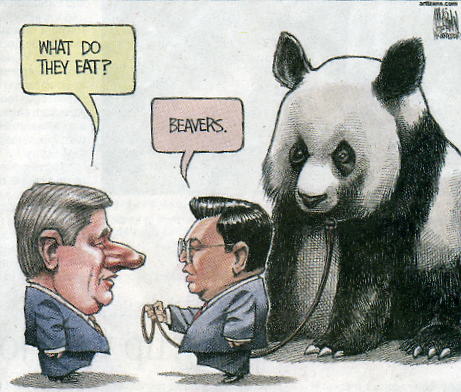 Uranium/oil/gas/wood etc to China against Canada's interests, CanCom, Feb 12, 2012
Uranium/oil/gas/wood etc to China against Canada's interests, CanCom, Feb 12, 2012BEIJING — The prospect of Canada entering free-trade talks with China is suddenly being discussed, as Chinese leaders indicated during Prime Minister Stephen Harper's visit that they are prepared to head down that path — even though Canadian officials aren't so sure this country is ready for the jump. The development came as China and Canada declared Thursday that bilateral relations have reached "a new level" following a series of multibillion-dollar trade and business agreements to ship additional Canadian petroleum, uranium and other products to the Asian superpower. The two countries have agreed that a joint economic study being conducted will be completed by May 2012, "after which Canada and China will proceed to exploratory discussions on deepening trade and economic relations."... The China Daily newspaper reported Thursday that Chinese Premier Wen Jiabao used his meeting Wednesday with Harper to urge him for an early signing of the foreign investment protection agreement (FIPA) following the conclusion of negotiations. Wen also told Harper the two sides "could step up discussions on the feasibility of a free-trade agreement," according to the newspaper...."The prime minister made it very clear that he's looking forward now to deepening our trading relationship with China," Fast said, and that the two sides want to make sure they identify the areas where there are complementarities in their economies. "Our end game is to deepen our trade relationship in one of our key priority markets, which is China."
Back in Canada, one of this country's foremost experts on Chinese affairs explained why China might appear keen to pursue free trade, while Canadians are more cautious. "The Chinese already do very well in our market and they would like to do better," said professor Charles Burton of Brock University in St. Catharines, Ont., and a former Canadian diplomat who worked in the embassy in China. "They have an excellent experience here (in trade) because we have the rule of law that makes contracts and they can be pretty much assured that if Canada agreed to something — that even if it turned out to work out against Canadian interests — that it would happen for them."... Harper and the Chinese leadership said Thursday the economic co-operation agreements — and billions of dollars in new private-sector deals — signed by the two countries over the past few days are unprecedented and will open the door to additional trade and investment.
The new deals further solidify a "strategic" partnership between the countries, particularly in terms of natural resources, with China's top political leaders calling for "more large-scale co-operation" with Canada on oil and gas to feed China's seemingly insatiable energy appetite. Harper announced Thursday, following meetings with Chinese President Hu Jintao and Vice-Premier Li Keqiang, that the countries have struck an agreement that will allow Canadian uranium companiesto "substantially increase exports to China." The new uranium protocol is a legally binding agreement that supplements a 1994 pact between Canada and China for peaceful uses of nuclear energy.... "The cumulative impact of these accords truly takes Canada-China relations to a new level," Harper told corporate leaders from both countries gathered in Beijing for the fifth Canada-China Business Forum....
On Saturday, he'll head to the southwestern metropolis of Chongqing, where he'll provide more details on China preparing to loan a pair of giant pandas to zoos in Calgary and Toronto for a period of five years each. Harper also announced during his speech to the business forum that more than 20 commercial agreements — valued at close to $3 billion and involving nearly 50 Canadian and Chinese companies — have been signed during the trade mission to the Middle Kingdom. "Canada has the resources, technological sophistication, and geo-strategic positioning to complement China's economic growth strategy. And China's growth, in turn, complements our determination to diversify our export markets," Harper told corporate leaders. "We expect to see similar success stories in Canadian energy exports to China, once infrastructure is in place." Harper has said building pipelines to the West Coast — such as the proposed Northern Gateway oilsands pipeline and a separate one for liquefied natural gas — is a national priority as Canada looks to ship its vast resources to Asia.... China is looking for more oil and gas from Canada, with Chinese Vice-Premier Li saying Thursday his country wants to increase imports of energy and natural resources from Canada.State-owned Chinese oil and gas firms have invested more than $10 billion into Alberta's oilsands and B.C. shale gas plays over the past couple of years alone, and the two partners expect the trend will continue. "Canada is one of the countries with a deep energy and resource reserve. China, meanwhile, is a large and stable market," Li, through a translator, told the business forum. He called for "more large-scale co-operation" on petroleum and minerals. "Never before has Canada-China business co-operation been so deep-based and wide ranging," Li added.
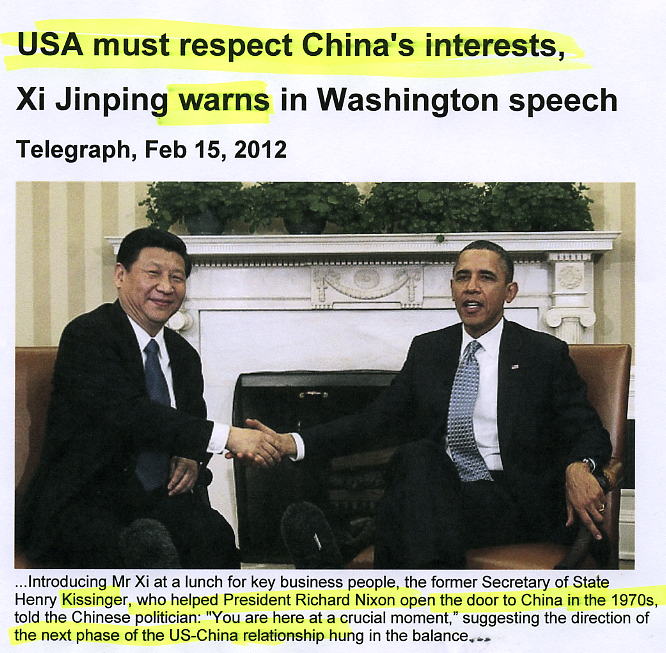

 USA must respect China's interests warns China (Kissinger opened USA's door to Communist China). Telegraph, Feb 15, 2012
USA must respect China's interests warns China (Kissinger opened USA's door to Communist China). Telegraph, Feb 15, 2012Communist China's spies get an easy ride in Canada
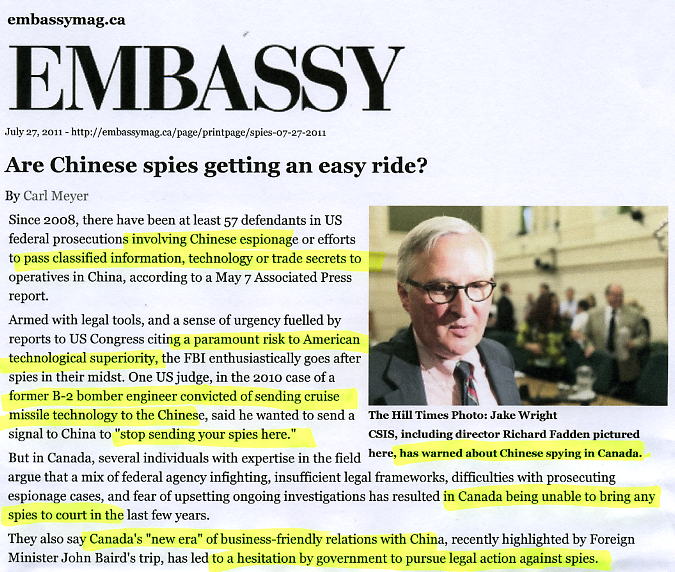
(government can't - or won't - nab a single spook)
USA's Obama losing Canada's oil to Communist China
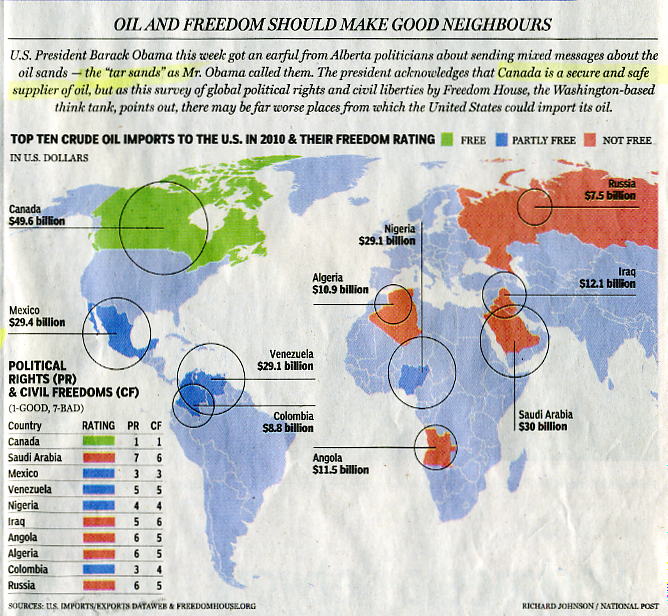


(rejects pipeline/100,000 jobs/millions of barrels a day)
Obama's new USA Ambassador to China is Chinese
(he former Sec'y of Commerce/Governor of Washington)
Obama's USA Secretary of Energy is Chinese
(plans USA import tropical-plant glucose to replace oil)
Obama's USA Secretary of Commerce is Chinese
(father born in China/grandfather a servant)
Communist China buys Canada top oil sands producer
(enemy nation owns/controls Canada gas/oil)
Embassy/Newsmax/Xinhua/NP, Jul 28, 2011


TAR-BABY OBAMA TARS OIL SANDS


CHINA TALONS IN CANADA OIL SANDS
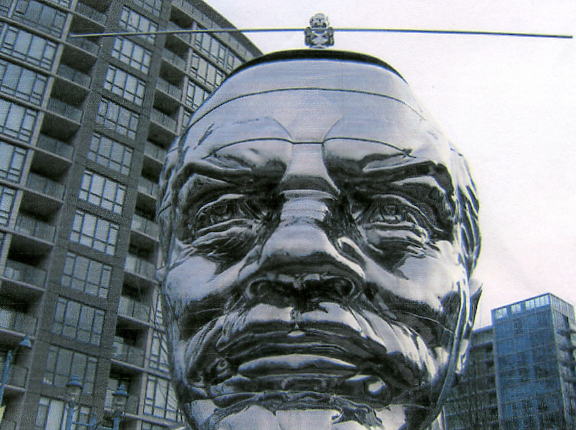
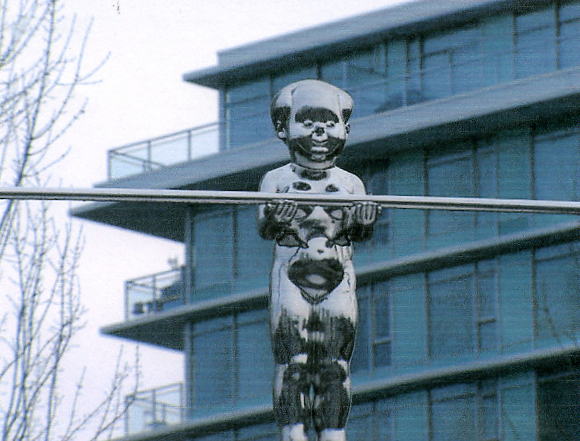
CANADA COMMIE LENIN-MAO STATUE


CHINA ATTACK USA THRU PANAMA?
& DRILL SARAH BABY DRILL
& 9.Masses Down & 7.Systems & 35.BB Brotherhood
Canada sets up commie-like police-state for fireworks
(Vancouver chief of police is Chinese)
CTV/VanSun/GM, Jul 29, 2011
WINSTON SMITH NOW WONG
Police disappeared from streets as riot began
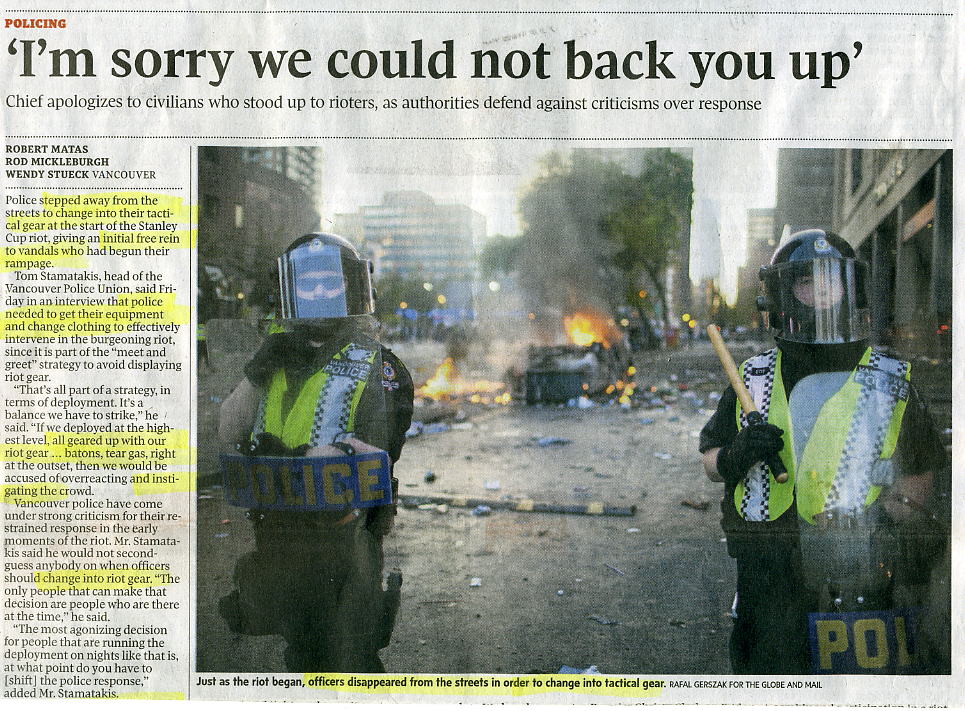


Buy T-shirt to appreciate Canada riot-police
POLICE DOGS IN ANIMAL FARM
& CANADA COPS UNLEASHED
& ORWELLIAN SECURITY OLYMPIC GAMES
21.Crimestop & 37.We Are Dead & 42.BB Tells Why
USA funds Communist China's 90-year propaganda movie
(soundtrack song "Striking Down the Western Powers")

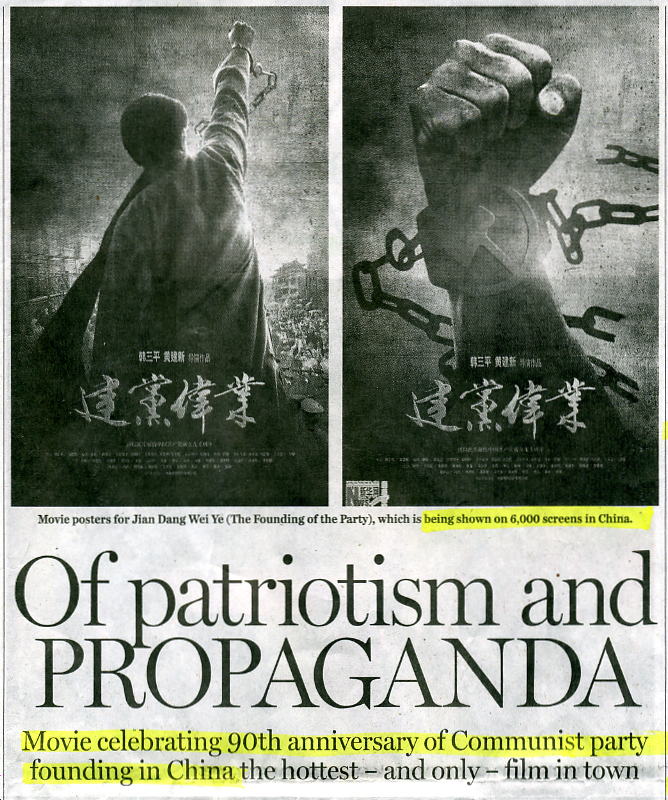
Kissinger: 21st Century will belong to China, not to the West
(behind USA building China's economic/military might)
National Post, Canada/China Day, July 1st, 2011
USA GAVE CHINA PANAMA CANAL
& CANADA'S RED TRUDEAU
7.Systems & 35.BB Brotherhood & 5.BB Pyramidal NWO
The truth hurts — don't turf spy boss for telling it like it is
by Mercedes Stephenson, TorontoSun, Mar 27, 2011
In any other country, a spy chief revealing concerns that members of government are believed to be under “at least the general influence†of foreign powerswould have been a wakeup call. In Canada, it resulted in calls for the senior spy’s head. Last week, opposition MPs on the Commons public safety committee tabled a report demanding CSIS Director Richard Fadden be fired for comments he made last summer. So just what did Fadden say that was so offensive? Essentially an inconvenient and politically awkward truth. In an interview with CBC, Fadden said CSIS was concerned politicians and political figures at various levels of government were being influenced by foreign governments. In response to a followup question, Fadden went on to say media reports suggesting China may be one of the countries spying on Canada are not far from the truth. Where is the big shocker here? That China is spying on Canada? Well, I am astounded! China, spying on people?! Surely a regime that harvests the organs of political prisoners would never do such an unconscionable thing. Get with the program people — everyone except for Canada spies.
There is compelling evidence that suggests the Chinese have a significant intelligence presence in Canada. My colleague, Brian Lilley, interviewed Chinese-Canadians last week who spoke about being intimidated by the Chinese state apparatus even after moving to Canada. He also pointed out that a former employee at China’s embassy in Australia, who defected, testified there were more than 1,000 Chinese spies operating in Canada. Beyond the anecdotal, there is the empirical. Computers traced to China have attacked Canadian computers at the Department of Foreign Affairs and the Treasury Boardrecently. When you can’t get on Google in China without the state’s permission, you can be sure there are no non-state hackers either. Look, it’s a perfectly sensible strategy for the Chinese to want to spy on Canada. Sun Tzu, the ancient Chinese military strategist whose wise words still guide many a general and businessman today, noted that in order to win the war without firing a shot one must “know your enemy.†What better way is there to know your enemy than to spy on them and infiltrate their government? It’s a much more effective and clean way of getting things done than all these messy wars western countries are apt to get into. Spying and influencing is subtle, relatively cheap and highly effective. If you’re particularly good at it, the people you’re influencing won’t always realize they have been influenced.
Richard Fadden wasn’t trying to fearmonger, he was raising a legitimate red flag about a threat to our national security. Hey, politicians, wake up! You may be doing another country’s bidding. He was also sending a very public message to the offending countries in question. Yes, there is more than one. Add Russia, Iran and several African, Latin American and western European countries to that list. Instead of waking up, opposition politicians decided to try to shut him up for doing his job — identifying a threat and challenging it head on. There are a lot of things a spy chief should be fired for. Speaking the truth is not one of them. Neither is speaking the truth in public when he can. The nature of intelligence is to never reveal sources or identifying information. Fadden would have damaged the reputations of particular individuals had he identified them, which he did not. For all the calls the opposition makes demanding more transparency in Canada’s security apparatuses, when they finally got it, they didn’t like it very much. But that’s the thing about the truth, sometimes it hurts.
MPs from all parties say CSIS spy chief must quit (aroused paranoia & suspicion against Chinese). CTV, Mar 23, 2011
MPs to scold spy chief over candid remarks on foreign interference
CTV, Mar 22, 2011
OTTAWA - The public declarations of Canada's spy chief will come under scrutiny once again when a Commons committee criticizes Dick Fadden on Wednesdayover comments about foreign meddling in national affairs. MPs on the public safety committee plan to table a report taking the director of the Canadian Security Intelligence Service to task for remarks that prompted a backlash last summer, The Canadian Press has learned. The report could revive controversy that flared last year when Fadden told CBC-TV he was in the process of warning at least two provinces — through the Privy Council Office — that members of their cabinets had come under foreign influence. He also said CSIS had suspicions about municipal politicians in British Columbia. Though Fadden was somewhat circumspect concerning the countries involved, he did not deny that China was a country that worried the spy service.
Fadden's interview enraged critics — including opposition MPs — who said the comments left a cloud over all elected officials with overseas ties. He quickly backpedalled, saying in a statement that he had not apprised the PCO [Privy Council Office] — the department that serves the prime minister — of the two cases because they were not serious enough. In a rare summer appearance before the public safety committee, Fadden acknowledged making comments of "unfortunate specificity" about foreign interference. But he stood by his general warning, saying there was no reason for him to step down or even apologize. Nor did he soften his message a few weeks later in a confidential report to Public Safety Minister Vic Toews, painting a broad threat from countries out to influence Canadian policy, target dissidents and steal technology. "Canada is a target for foreign interference due to our natural resources, scientific and technological sectors, our role and influence in the international community, and our close relations with powerful allies," says a declassified version of Fadden's lengthy memo to the minister.
The opposition has refused to let the matter drop. "You cannot drop a bomb like that and not clear the air afterwards," Liberal public safety critic Mark Holland said in October. Don Davies, the NDP public safety critic, said Fadden left a stain on provincial cabinet ministers across Canada and municipal politicians in B.C. —comparing Fadden to U.S. senator Joseph McCarthy, who made accusations of disloyalty during the Cold War. "The Chinese-Canadian community was particularly singled out. His McCarthy-like accusation tarred them all," Davies said in the Commons. "Chinese-Canadians feel as though their loyalty to this country has been called into question. In my riding, I have heard this repeatedly."

 GOUZENKO OUTED TRUDEAU SPIES
GOUZENKO OUTED TRUDEAU SPIES 'Spanking new book' on Soviet spy story (Gouzenko exposed Can/USA/UK espionage). National Post, Dec 4, 2010
'Spanking new book' on Soviet spy story (Gouzenko exposed Can/USA/UK espionage). National Post, Dec 4, 2010Politics Overshadowing Foreign Influence Threat
Fadden’s critics aren’t helping Canada or themselves, say panellists
by Matthew Little, Epoch Times Staff, Nov 24, 2010
PARLIAMENT HILL, Ottawa — CSIS Director Richard Fadden unleashed a political firestorm with allegations Canadian politicians were under the influence of the Chinese and other foreign regimes, but we still haven’t learned the lesson. That was one theme of a forum at 131 Queen Street on Wednesday night. In an office building where Parliamentary committees sometimes meet to scrutinize possible legislation, panellists told attendees about the shadowy world of espionage and the risk of ignoring Fadden’s warning. While the government [Conservative party] has stood behind Fadden, theopposition parties have denounced the director as a racist who smeared politicians and Chinese Canadians alike. A Liberal [opposition party] motion tabled at the Public Safety committee Oct. 27 called for Fadden to resign and apologize for comments given in a CBC interview alleging some municipal and provincial elected officials looked to be under the influence of a foreign regime. Fadden also suggested some agents of influence were recruited while still in university in Canadian schools and that some people didn’t even realize they were being used by a foreign power.
But denouncing Fadden’s warnings as racist is a betrayal of Canadian interests that Michel Juneau-Katsuya, former head of the Asia desk for CSIS, thinks is aimed at garnering ethnic votes. Speaking at the forum on Wednesday, Juneau-Katsuya questioned the loyalties of elected representatives who focused their outrage on Fadden rather than any foreign regime that may be trying to undermine Canadian interests. “This practice is as old as the world, where there are people in power, there will be people trying to get access to them. So why are MPS acting like it does not happen?†Juneau-Katsuya said if Canada is naive about the threat, that makes it easier for spies, especially if those inclined to speak out about the danger will be attacked by the people who should push for action. Overlooked, he said, were the ethnic communities that often feel the brunt of foreign influence exercised in Canada, like Iranians and Chinese dissidents who are subject to coercion, threats and intimidation by foreign regimes. Instead of protecting their constituents, Juneau-Katsuya saidsome politicians ended up helping tyrannies from abroad. “Rather than shoot the messenger ... you should look at your own riding,†he advised elected officials. “I invite you to rethink whose interest you are serving. Rest assured, foreign spies are smiling on you.â€
Sheng Xue knows what it means to speak out on human rights from within the Chinese community. After witnessing the Tiananmen Square Massacre, she fled to Canada and started calling for democracy in China. Attempts to go back to China years later to visit her mother after her father died were met with detention there and expulsion back to Canada. It is a threat every Chinese Canadian knows well, she said. Like the friend who wanted to meet her with but wouldn’t talk to her on the phone or come to her house. Instead they met at a coffee shop. When asked why he would not come to her home, he said her house was being monitored by Chinese agents. “People don’t feel safe even though they are living in Canada,†she said. She went on to recount tale after similar tale. Chinese Canadians afraid to attend protests, public events, or raise their voice about issues in China out of fear they would be forever banned from their motherland or expose their families there to a backlash from the authorities. It is a lesson most Chinese learned in China, she said. “They have been trained to be very well self-censored.†It is a concern many Chinese Canadians will quietly raise, though rarely openly. Those who do speak loudly find themselves targeted by the regime. Those who do not, remain afraid, said Sheng. “The fear is in our heart, it is in our lifestyle. What can we do about that? They have a very strong tie with China, their family, their relatives, their elder, their business.†Sheng says many feel their lives are more in the hands of the Chinese communist regime than the Canadian government. For those pushing for a better future for the Chinese people, sometimes the reception in Canada is harder to take than the regime’s bullying tactics. Like Fadden, those who raise a voice for the 1.3 billion Chinese who have no basic human rights often find themselves labelled and dismissed. “I love China, I am not an enemy of China,†said Michael Craig, Chair of China Rights Network, a coalition of China-related advocacy organizations.“I shouldn’t have to say I am not an enemy of China, but I am often regarded as one.â€
Craig noted that to criticize the regime is not to attack China and that speaking against rampant abuse of Chinese citizens isn’t aimed at — though that is a line frequently used by the pro-Beijing business lobby. It is also a line that the Canadian government seems more than willing to go along with, he said. "I think it is fair to accuse our federal government of kowtowing to Chinese economic power. I think it is time we said ‘wake up Canada’.†Other speakers at the forum included Clive Ansley, a lawyer who practiced in China for 17 years and was the president of the Canada China Business Council in Shanghai. After noting thatthe Chinese Communist Party has killed somewhere between 40 million and 80 million people, more than Joseph Stalin and Adolf Hitler combined, Ansley described the reception many critics of the Chinese regime get in Canada. “Critics of the party are often accused of what is indicated to be a crime even worse than the murder of all of these Chinese people, that is, the crime of hurting the feelings of the Chinese people.†Rather than holding the Chinese regime to task for the abuses it is condemned for, those criticisms are twisted into attacks on the Chinese diaspora, said Ansley. He takes issue with those who conflate the Chinese Communist Party with the Chinese nation, a notion at the very heart of the regime’s formidable propaganda efforts domestically and abroad. The Canadian Chinese community is not a political monolith uniformly supporting Beijing and its varied positions, and to say so stifles discussion, he said. “We cannot allow the Chinese Communist Party and their apologists to restrict the debate in this way. Beware those who purport to speak for the entire Chinese community. In my view, Richard Fadden earned the gratitude of most Chinese Canadians.†He said Fadden shone a spotlight on a serious problem and is now being punished for it.
The last person to speak was Grace Wollensak, a representative from the Falun Dafa community, widely held to be the group most targeted by the Chinese regime. She kept her presentation brief compared to the other speakers but took the time to note the observations of Chen Yonglin, the former consul for political affairs in the Chinese consulate in Sydney, Australia, who defected in 2005 and pulled back the veil on what Chinese consulates are up to. He told the world that suppressing the activities of Falun Gong practitioners abroad was half of the consulate’s work load. He also exposed the regime’s favourite way to win over critics, said Wollensak. “One of the most effective methods used to influence political leaders is to provide them with all-expenses-paid travel to China and lavish entertainment.†Ansley noted that buffet dinners weren’t the only things many visitors swallowed.
"I spy something stupid" in Canada
(politicians calling for CSIS boss to resign are fishing for votes among Chinese-Canadians)
by Brian Lilley, Toronto Sun, Oct 29, 2010
Perhaps the most offensive thing in Canadian politics is ethno-politics, the attempt by parties to buy voting blocks from immigrant or ethnic groups. All parties play the game and, regardless of the player, it leaves a bad taste in my mouth, but this week the Liberals [opposition party to governing Conservative party]took the rotting, rancid cake. Putting partisan politics above national security, the Liberals announced they would table a motion to call for the resignation of CSIS director Richard Fadden. His alleged crime? “Smearing the Chinese-Canadian communityâ€. Fadden, you may recall, spoke bluntly and publicly in June about the problem of foreign governments attempting to influence Canadian politicians. “We’re, in fact, a bit worried in a couple of provinces that we have an indication that there’s some political figures who have developed quite an attachment to foreign countries,†Fadden said in an interview with the CBC. “There are several municipal politicians in British Columbia and, in at least two provinces, there areministers of the Crown who we think are under at least the general influence of a foreign governmentâ€.
If the Liberals really think there are not foreign agents either openly or covertly trying to influence Canadian political leaders, then Michael Ignatieff’s team is in worse condition that I thought. “There are thousands of Canadians who feel slighted and humiliated by a senior government official who deliberately cast suspicion on their loyalty,†Liberal MP Joyce Murray said in a statement announcing the motion to have Fadden fired. Really? A senior government official, Fadden, said there are foreign governments trying to influence Canadian politicians and people are upset about this? What they are likely upset about, if they are bothered at all, is by the spin coming from the likes of the Liberals and others fishing for votes from Chinese-Canadians...
Anyone who doesn’t think there are Chinese spies or agents operating in Canada needs to give their head a shake. There are also Russians and agents from countries in the Middle East [Israel]. One security expert even told me there are French agents at work in this country. We can argue about whether Fadden should have made his statements to the media, but the idea that there are no spies in Canada is ridiculous. The idea that the career civil servant smeared Chinese-Canadians is even more ridiculous. Instead of fishing for votes, perhaps the Liberals should speak to Chinese-Canadians who are spied on by Beijing — Chinese-Canadians who are harassed in this country for their beliefs. The type of pandering the Liberals are involved in should be below them, it should be below Ignatieff. Canadians and Richard Fadden deserve better.
Canada PM marks 40th anniversary of diplomatic relations with China
Prime Minister Office, Oct 13, 2010
Prime Minister Stephen Harper today participated in a conference in Ottawa to mark the 40th anniversary of diplomatic relations between Canada and China. In his speech, Prime Minister Harper spoke of the dynamic and expanding relationship between the two countries, while highlighting a number of bilateral accomplishments in the past year. Two significant trade-related accomplishments include staged access for Canadian beef to the Chinese market and thegranting of Approved Destination Status to Canada. Other accomplishments include new agreements on climate change, mineral resources, cultural and agricultural education, tourism, environmental protection, energy conservation and law enforcement. “Today’s anniversary reminds us of our shared heritage, and our common potential,†said Prime Minister Harper. “It is an opportunity to celebrate not only 40 years of diplomatic relations, but also a growing partnership and a bright future for our two countries.†The Prime Minister noted how Canada’s energy resources, favourable business climate, geographic proximity and recent billion dollar investment in Pacific coast infrastructure make it an ideal trading and commercial partner for China. “As the centre of gravity of the world economy swings towards the Pacific, we are in a unique position to cooperate for our mutual benefit,†said the Prime Minister. Prime Minister Harper added that the recent opening of the Chinatown Gateway in Ottawa is a fitting tribute to the friendship and shared history between the two countries. “The friendship between China and Canada has also grown in recent years in the context of a frank and respectful dialogue on the universal principles of human rights and the rule of law,†continued the Prime Minister.
Canada's Public Safety Minister Toews won't discuss spy-chief Fadden's remarks
(CSIS says China is influencing Canadian politicians)
CTV, Oct 20, 2010
Ottawa — Public Safety Minister Vic Toews is refusing to appear before a House of Commons committee to answer lingering questions about contentious comments by Canada's spy chief. A Public Safety Department official told the committee Tuesday that Toews -- the minister responsible for the Canadian Security Intelligence Service -- will not testify at a hearing Wednesday. CSIS director Dick Fadden said in a June television interview that he was in the process of warning at least two provinces -- through the Privy Council Office -- that members of their cabinets had come under foreign influence. He also said CSIS had suspicions about a number of municipal politicians in British Columbia. Fadden was coy about the countries involved, but did not deny that China was a country of concern. In an email to the committee clerk, the public safety official says Fadden [CSIS director] has already made himself available to the public safety committee "for a full two hours" on the subject. [In contrast] "The minister [Public Safety Minister Toews] respectfully declines the committee'sinvitation."...
[Canada's National Security Advisor] Morin [Marie-Lucie] has also been called to the public safety committee. The Privy Council Office said Tuesday she would not appear either. CSIS [Canada's Security & Intelligence Service] has passed its report on alleged foreign influence to Toews [Canada's Public Safety Minister]. "Talking points" prepared for Toews -- and vetted by the Privy Council Office -- after Fadden [CSIS Director] made the controversial comments suggest that CSIS making the government aware of foreign interference concerns is similar to the spy agency advising officials of possible terrorist activity or espionage. "It is important to note that CSIS's view of such cases represent only one perspective and whether the government chooses to act in any particular case is never a foregone conclusion," say the notes. "This has always been the case in Canada and is also the case elsewhere."...
Provinces' politicians deny CSIS foreign-influence allegations
by Joanna Smith, Ottawa Bureau, Toronto Star, Oct 15, 2010
The Ontario and British Columbia governments had no serious concerns after being briefed by the Canadian spy agency about explosive allegations thatcabinet ministers were being clandestinely influenced by foreign agents. The revelation raises new questions about why the head of the Canadian Intelligence Security Service ever bothered to drop the bombshell in a speech and a nationally televised interview if there was never anything to worry about.A spokeswoman for Ontario Premier Dalton McGuinty said provincial government officials contacted CSIS after its director, Richard Fadden, claimed earlier this year that two cabinet ministers in two unnamed provinces — as well as several B.C. municipal politicians — were vulnerable to inappropriate influence by foreign governments and had begun shaping public policy accordingly. “Nothing of substance was provided to suggest that any Ontario minister is under the influence of a foreign government,†Jane Almeida wrote in an email Friday night. “We assume the matter is closed and any further questions should go to CSIS.†When asked whether she was implying that an Ontario cabinet minister was the subject of the allegations but that it was not serious enough to worry about, Almeida said: “I have nothing further to add.†The statement follows the news that Fadden provided more details concerning the claims he made. The details were blanked out from a heavily censored, undated, draft version of a top-secret memo given to federal Public Safety Minister Vic Toews and obtained by the Star through a request under the Access to Information Act.
Liberal MP and public safety critic Mark Holland (Ajax-Pickering) said that if the suspicions are of no concern to those they appear to involve, then it remains unclear why Fadden mentioned them in the first place. “It begs the question why Fadden went public with this and created such huge commotion and so much damage,†Holland said Friday. “You have to ask the federal government as to whether or not they take these questions seriously, because these allegations are doing deep damage. There are many communities that are feeling the pain from these accusations, but if the (B.C. and Ontario governments have) looked at the evidence and (say) that it doesn’t warrant concern, then you have to ask why people are being dragged through this.†A spokesman for [British Columbia] Premier Gordon Campbell said on Friday that Deputy Premier Colin Hansen had discussions with CSIS and came away with “no fundamental concerns.â€â€œThe Premier hasn’t seen the memo and he hasn’t had any discussions with Minister Toews or Richard Fadden,†Campbell’s spokesman Dale Steeves said Friday. “The Premier’s deputy has had discussions with CSIS and those discussions didn’t result in any fundamental concerns. The Premier is aware that the deputy and CSIS have spoken and he is satisfied that his deputy feels that there are no fundamental concerns.†[BC Premier's spokesman] Steeves also would neither confirm nor deny that his statement meant that a BC cabinet minister had been named by Fadden. “That’s all I can say. He [BC Premier] has no fundamental concerns,†Steeves said.
[British Columbia Premier] Campbell and [Ontario Premier] McGuinty had both come out swinging after Fadden raised the spectre of nefarious foreign interference in domestic politics following a March speech to the Royal Canadian Military Institute in Toronto and a CBC interview that aired in June, where Fadden said as many as five countries — including China — were hard at work infiltrating ethnic communities and building relationships with politicians, public servants and candidates at all levels of government. But now that specific information has been delivered to [Public Safety Minister] Toews as Fadden promised when he was hauled before the Commons public safety committee — where he told MPs he would name names for the federal government within four weeks of his July 5 appearance — it remains unclear whether anyone is worried enough to do anything about it.
[Public Safety Minister] Toews was again unavailable for an interview Friday. His spokesman Mike Patton, who on Thursday had cited national security to avoid saying what the minister planned to do with the information, said in an email on Friday: “We have commented as much as we are prepared to on this story.†The Star contacted the offices of all ten provincial premiers Friday and of the seven that responded, none indicated they were anywhere near conducting witch hunts in their cabinets. Spokespeople for premiers in Newfoundland and Labrador, Alberta and Saskatchewan all said their governments had contacted Ottawa and were told no one in their provinces were under suspicion. Nova Scotia and Manitoba spokespeople both said they had not been contacted by the federal government. Aides for the premiers of Quebec, New Brunswick and Prince Edward Island did not respond to requests for comment. New Democrat MP and public safety critic Don Davies (Vancouver Kingsway) expressed some confusion over what is supposed to happen now. “It’s becoming a comedy of errors,†said Davies, noting that after Fadden said he was worried about foreign interference, he later backtracked and said the specific cases had not been serious enough to flag outside the spy agency. “I can’t tell if this is a serious issue or not a serious issue.â€
China to play big role in Canadian energy, minerals
China People'Daily, Oct 13, 2010
...In May, representatives of Canada's three most resource-rich provinces, British Columbia, Alberta and Saskatchewan, visited Beijing to seek Chineseinvestments. At the same time, the three provinces also opened trade representatives offices in Shanghai. "Rich in natural resources, Canada will play an important role in China's energy security plans," Xia Yishan, a researcher with the China Institute of International Studies, told China Daily earlier this year....
Canada lauds China
Ottawa Bureau, Montreal Gazette, Oct 13, 2010
In a week that began with two foreign-policy disappointments, Prime Minister Stephen Harper focused on a more upbeat international angle Wednesday: the economic bounty from four decades of diplomatic relations between Canada and China. Forty years to the day Pierre Trudeau's Liberal government established diplomatic relations with China, the Conservative prime minister declared in a speech that "the strategic partnership between Canada and China has never been more promising." He [Prime Minister Harper] portrayed Canada as "an emerging energy superpower" on which China could depend for stable supplies. And he noted the [Canadian] government's $1 billion investment in Pacific Coast infrastructure was "providing the fastest way for Asian exporters to reach the heart of the North American marketplace." Harper spoke to China's ambassador Lan Lijun, China experts, former ambassadors, senior officials, business leaders, MPs and others among about 150 guests during a reception at the 40th anniversary of Canada-China relations national conference sponsored by the China Institute of the University of Alberta and the Department of Foreign Affairs and International Trade. [Canada's Prime Minister] noted that two-way trade between the countries now stands at $51 billion annually, and that Canada has been granted "approved destination status" for Chinese tourists, "a change that will give a huge boost to our Canadian tourism industry." Agreements had been reached on beef and an array of other products and sectors....
City Hall's Chairman Chow, Vancouver Courier, Oct 13, 2010
Russians wanted undiplomatic stuff: Liberal, National Post, Sep 5, 2010
A long-time Quebec Liberal says foreign diplomats are actively engaged in Canadian politics in an attempt to shape policy, sometimes crossing the line from diplomacy to outright interference. "Everybody thinks it's OK, but it's not OK," said Daniel Sweeney, the director of a federal Liberal riding association in downtown Montreal. "It's got to be made public that it's going on, so people can stand up to take action, to make sure that political party administrators across the country...take note and stop it." Mr. Sweeney said his experience goes back more than a decade, when he was with the cultural communities commission of the provincial Liberal party, then in opposition, and was asked to approach foreign diplomats to build contacts with various expatriate communities. He said he was coming forward now after hearing warnings made last June by Richard Fadden, the director of the Canadian Security Intelligence Service,about foreign influence in Canadian governments.
"Diplomatic officials, over time, started to ask me to do all sorts of stuff that was not diplomatic," said Mr. Sweeney. "That involved changing party policy and creating special favours for people in their respective expatriate communities in Montreal - especially the Russians, but others, too." In one case, he was asked to support a special program for the development of Canada's north by Russians with experience working in those conditions. There were also suggestions in meetings with the consulate about easing equivalency requirements in various professions, as well as requests to fast-track requirements on foreign investors immigrating to Quebec, he said. "Their line was always: 'It's good for the Russian community'", he said. Overwhelmed by the repeated requests, Mr. Sweeney filed a complaint with the RCMP. A few weeks later, he said he was contacted by an operative from CSIS, whom he would then meet with regularly for about two years until 1998. Mr. Sweeney said CSIS used him as a plant to investigate a Russian diplomat. Every time he had a private meeting with the Russian, Mr. Sweeney said he would meet with the CSIS agent, often in public places, ranging from rooftop patio restaurants to downtown cafes. Christian Martin, who was president of the party's cultural communities commission when Mr. Sweeney was involved, confirmed that the Quebec Liberals had a practice of approaching foreign diplomats in their outreach activities, but he raised doubts about whether party members were vulnerable to foreign influence.
Public Safety Minister baffled by CSIS flap
by Kathryn Blaze Carlson, Postmedia News, Aug 10, 2010
Public Safety Minister Vic Toews says he's "astounded" by the uproar over allegations by the country's top intelligence officer that some provincial cabinet ministers and municipal politicians have come under foreign influence. "There's nothing remarkable about the fact that governments may seek to influence politicians or senior bureaucrats," Toews said, addressing about 50 guests at a luncheon at the Economic Club of Toronto. "I find it astounding that this would be a news story." Toews, who was at the downtown Toronto venue to speak about the "reality of Canada's national security in 2010," said the notion foreign governments may seek to influence politicians is something he has been reading about in the "pages of newspapers across this country for the past 20 or 30 years." His comments contrast those made by the Prime Minister's Office earlier this summer, when it said it has "no knowledge of these matters." CSIS director Richard Fadden made the controversial comments during an interview with CBC television in June, and has since testified before a House of Commons committee. He faced a backlash from at least three premiers and members of the Chinese-Canadian community. "Certainly,nothing that I heard Mr. Fadden say should come as a surprise to members of the media," Toews said.
Canada Spy Agency Head's Remarks on Chinese Communist Party Only "Scratched the Surface"
NTDTV, Aug 5, 2010
Recent comments from Richard Fadden, the head of Canada's top spy agency, have caused uproar in Canada. Back in June, the Director of the Canadian Security Intelligence Service, or CSIS (SEE-sis), said in an interview with CBC that foreign governments were trying to influence Canadian officials. Fadden also told CBC that foreign governments are trying to gain influence with future politicians — by targeting them while they're still in university. He says the Chinese regime is the most aggressive — funding university clubs managed by the embassy and consulates. But according to one Canadian MP, Fadden's remarks have only "scratched the surface." Rob Anders, MP for Calgary West, told The Epoch Times that Chinese authorities have used lucrative business deals, lavish gifts, and even young seductive women to influence Canadian politicians. He says he knows of specific cases, but would not give out names. Anders also says some politicians who return from trips funded by Chinese authorities change their minds about things like human rights abuses committed by the regime.Despite the explosive reaction to these remarks, one former senior intelligence official says he's not surprised by the revelations. [Michel Juneau-Katsuya, Former CSIS Asia Bureau Chief]: "The Communist Party of China is not in the game of playing [with] the rules as we understand it. Propaganda is the name of the game, control and influence is the name of the game. They have been doing it for decades."
Tory MP alleges China bribing officials
by Althia Raj, Parliamentary Bureau, Toronto Sun, Jul 31, 2010
A Conservative Member of Parliament says some of his colleagues have fallen into traps laid by seductive Chinese spies, lavished with gifts of alcohol and too-good-to-be true business deals, and at least two MPs have been subsequently blackmailed. Calgary MP Rob Anders claims both cases occurred in Shanghai, where an MP was offered a rich but skeptical business deal. In the other case, he said, the MP accepted sexual favours. In return, Anders said, politicians can provide access to resources or rubber stamp business deals. Anders said many current MPs have told him that on their trips to China they’ve been approached by stunning women half their age “offering them to go out dancing, go to dinner, get a massage.†“I know MPs who have taken up those offers,†he said, adding that that some ministerial staffers have also been compromised. “They have to understand that when they are being done, they are probably being taped (and) those tapes can, and will, be used,†he said. Anders has no physical proof and refuses to name names, saying he’s not out to create a witch-hunt. “My purpose in doing this is not to end colleagues’ political careers,†he said. “My purpose is to educate them so they are better aware of how they can be manipulated.†Anders said he has personally witnessed the sons of two different MPs being seduced by women far too attractive to be interested in these “average looking†guys, including a 14-year-old, in Taiwan. “There is no way that any of those people could have been anything other than influence peddling agents,†Anders told QMI Agency. “That person is up to something when they knock on your door, minutes after your arrival in a foreign hotel offering themselves to you.†He said he has personally been offered a business deal that was far too lucrative and suggests other MPs may not have declined the “bribes". He said he’s discussed the matter with the Canadian Security Intelligence Service (CSIS). Prime Minister Stephen Harper’s spokesman refused to comment on Anders’ assertions that Chinese infiltration had crept into the federal government. “Mr. Anders’ remarks are his and his alone and do not represent the government’s views. We have no comment on them,†Andrew MacDougall said.
Chinese-Canadian leader laments spy-agency allegations
Conservative MP fuels suspicion of government officials
by Mike Howell, Montreal Gazette, Jul 29, 2010
Allegations made recently by the head of Canada’s spy agency that several unnamed civic politicians in B.C. are under the influence of one or more foreign governments dominated the discussion at a forum on national security Tuesday. David Choi, co-chair of the National Congress of Chinese Canadians (Pacific Region), said CSIS director Richard Fadden’s comments continue to leave a cloud hanging over local politicians and the Chinese-Canadian community. “I don’t need to have my heart broken now by my country, Canada,†Choi told a small crowd assembled in a room at the Kitsilano Community Centre. Fadden’s comments surfaced in an interview in June with CBC News. Fadden hinted in the interview that China was one of the countries wielding influence on B.C. municipal politicians. He also suggested two unnamed cabinet ministers from two provinces were being influenced by foreign governments. But Choi said the aspersions cast on politicians has spread through the Chinese community and fuelled suspicion about whether local residents could be foreign agents. “It’s affecting people applying for jobs, it’s affecting people that are working inside government and asking for promotions,†said Choi, although he didn’t provide examples. “To say this is not in the back of the mind of an interviewer is not true.†Vancouver-South Liberal MP Ujjal Dosanjh and his party’s national security critic, Ajax-Pickering MP Mark Holland, hosted the forum, which was attended by about 20 people, including Liberal senator Mobina Jaffer.
Choi urged Dosanjh and Holland to continue to pressure Prime Minister Stephen Harper to have Fadden release specific details on the allegations concerning politicians. At the request of Holland, Fadden appeared before a parliamentary subcommittee in July. The CSIS director refused to name names or elaborate on his claims. Parliament has since recessed for the summer and MPs aren’t expected to return to Ottawa until September. It’s unclear whether Fadden will appear again before the subcommittee. “It’s putting democracy on hold,†Choi said. “This prime minister has no right to ignore accountability when a senior bureaucrat has inflicted harm on innumerable innocent people. This is simply not the Canada that we know.†Choi sent a letter to FaddenJuly 2 on behalf of the National Congress of Chinese Canadians. The letter was signed by the Chinese Benevolent Association of Vancouver. “The Chinese Canadian community is interested to know whether you realize the full implications and ramifications of your comments and the damage that has been inflicted upon countless Canadian citizens and immigrants,†said the letter in which Choi invited Fadden to meet with local Chinese-Canadians. Holland agreed with Choi’s comments, saying Harper should have directed Fadden to produce evidence and prosecute politicians. If there is no evidence, then Fadden should be fired, Holland said. “You can’t allow these allegations to hang in the air,†he said.
Dosanjh said the outrage has spread further now that Conservative MP Rob Anders from Calgary this week told the Epoch Times, an international newspaper founded by Falun Gong practitioners, that “this situation is far worse than what [Fadden] let on.†Dosanjh pointed out the Prime Minister’s Office has not discounted Anders’ claims. “The fact that the Prime Minister’s Office has done nothing with regard to Anders’ statement might tell you something, should tell us something and I think it’s cause for worry,†he said. Mayor Gregor Robertson* and Vision Vancouver councillors Kerry Jang and George Chow have also written letters to Fadden expressing their concerns about aspersions cast on politicians.
*Gregor Robertson, the mayor of Vancouver, is a descendent of a Canadian Communist honoured in a speech by China's leader Chairman Mao: ("...Comrade Norman Bethune, a member of the Communist Party of Canada, was around fifty when he was sent by the Communist Parties of Canada and the United States to China...")
Canada MP witnessed China's attempts to gain influence over politicians
(free trips to China, honeytraps, lavish gifts used to compromise Canadian officials)
by Omid Ghoreishi, Epoch Times Staff, Jul 21, 2010
It could take the form of a guaranteed business deal, a lavish gift, or a young seductive woman at a bar. The end goal is always the same for the Chinese communist regime — to gain influence over Western politicians, says Rob Anders, Member of Parliament for Calgary West. “The reach is deep, and it’s very unfortunate.†Anders says the extent of the regime’s influence goes even beyond what Richard Fadden, head of CSIS, Canada's intelligence agency, said in comments on CBC in June or his televised appearance before a parliamentary committee earlier this month. “I would argue that I’ve seen things happen on a federal level as well in our own government. And so I think there’s a lot more than he has even mentioned,†he says. “I think that Mr. Fadden only gingerly scratched the surface. I feel for him that he was dragged before an investigative committee with parliament, to have to explain, and I think that this situation is far worse that what he let on.â€
Last month, Fadden said in an interview with CBC television that some Canadian officials are under the influence of foreign regimes, alluding to China as the most aggressive country in the effort to gain influence. He said that many of those being manipulated by Beijing were not even aware they were acting on the regime's interests due to the long-term nature of their relationship with Chinese agents of influence. Anders says he has seen aspects of that occur. “What will happen is MPs are given five-star treatment when they go to China, and they’re being introduced to young people who speak immaculate English…and given the impression that China wants to be just like Canada,†he explains. “They get approached by people who offer them business deals that frankly are too good to be true, because these are deals that are being set up by the Communist Party, and are being done as an informal wayto bribe Western politicians, because it sounds like a business deal, but they are business deals that never fail, and are very lucrative.†In some publicized cases in the past, politicians from other countries have been lured by young attractive women and then blackmailed or robbed following their dalliances. I’ve seen a lot with my own eyes,†Anders says. “It is so very troubling for me to see that.â€
He says he has warned other politicians that expensive gifts, business contacts and attractive young women who are “far, far too attractive for a 50-year-old balding politician,†are used to manipulate them. He adds that much of the prosperity the Chinese regime evinces and offers Canadian politicianscomes on the “backs, the blood, the sweat, and the tears of the people who are suffering in slave-labour camps in China — the people who wrap five or seven thousand chopsticks a day, the people who are their political prisoners.†Ministerial staff members are also targeted by the Chinese regime, he says. “I have heard of ministerial staffers who have been invited out to karaoke events. They’ll have a couple of girls who will say, ‘How long are you in town for? Maybe you’d like to have some fun. Maybe you’d like to go out for dinner. Maybe you’d like to go karaoke.’ And they work these guys, they put some alcohol in them, and then, pretty soon, one thing leads to another. And you know, they can video tape these types of things.â€...
Michel Juneau-Katsuya , a former CSIS agent and head of the agency’s Asia-Pacific desk, said that Chinese intelligence agents look for sympathetic politicians and other key staff members who can be coerced, bribed, or simply charmed to help the Chinese regime achieve its foreign policy objectives. Thegoal of all the intelligence-gathering is to gain influence, Juneau-Katsuya said. Anders believes some politicians have allowed such trips to affect their convictions regarding human rights abuses in China. “They've got some skepticism, some doubts. But then, they get invited on a five-star trip to luxury hotels.†Upon their return to Canada, their concerns about human rights violations are either dimmed or forgotten, he says. Anders says the regime will focus on those who are not supportive of its positions rather than those who already take a stance favourable to its interests. Sometimes, he says, they will send agents who claim they are opponents of the regime. They will say, “’Maybe you can give us the names of people who are opponents of the regime. Maybe you can tell us some things about people who oppose it,’ etc.†Anders says he has been subject to this approach himself. A man who later turned out to be involved in the infamous Profumo scandal in Britain many years ago, approached him to raise money to air a documentary on the Tiananmen Massacre at the time of the Beijing Olympics to cause embarrassment to the Chinese regime. “I found out later that was totally a ruse, and that his purpose was to find people who were sympathetic to the cause, who might give it funding and money.â€
Anders says the Chinese regime especially targets people who are in the middle, “the ones who aren’t already in their pocket,†but who aren’t very opposed to them and are needed to sway to have the majority opinion on their side. “If you work on the ones who just don’t know, and give them a lavish, five-star trip over to China, and you provide them a prostitute or you give them a lucrative business deal or any number of those things, it’s surprising how effective that can be.†The regime also targets members of the expatriot Chinese community. Anders says he has seen in Canada many cases in which regime officials threatened the businesses of the associates of Falun Gong practitioners, a meditation group persecuted in China, and exposed them to hate propaganda, or made threats against family members of Falun Gong practitioners who reside in China. “And that’s one of the reasons I haveserious issues with as many consulates as there are for the People’s Republic of China, because I think every single one of them is being used as an espionage outlet, and a pressure tactic against Falun Gong practitioners, and a number of others here,†he says.
Anders says Fadden should be commended for coming forward with his remarks, and should be encouraged to reveal more. “In Chinese culture, the idea of saving face and being treated well is important. I think it’s very important to blacken their eye, and to let the People's Republic of China know that we’re onto them, and that they get bad press over these issues, and that it’s drawn out into public attention and given scrutiny. “If we don’t hear and speak the truth on these types of things, I think we are only eroding our Canadian values by not talking about it openly.â€
Make CSIS’s Fadden come clean, or fire him, says Kwan
by David Beers, The Tyee, Jul 8, 2010
BC NDP MLA Jenny Kwan is telling federal Public Safety Minister Vic Toews to fire CSIS Director Richard Fadden if he doesn’t clear up his statements that some politicians in Canada are under foreign control. In a statement issued today, Kwan said “public remarks by Fadden on three separate occasions are continuing to create confusion†and may put at risk ties with China and other nations that Kwan and other politicians in B.C. have been trying to build for years. “As we continue to work diligently to build relationships with China and other countries as elected officials, are we now under threat of surveillance by CSIS?†Kwan asks in her statement. Kwan, who is Economic Development Critic for the NDP opposition in B.C., goes on to ask: “If Richard Fadden can have CSIS spy on elected leaders without providing details, then it raises serious questions about who is in charge and if public oversight of the security agency is adequate.†Kwan’s 19-paragraph statement demands that Fadden address a number of questions raised by his recent statements, and ends with this demand: “If Mr. Fadden won’t act on his own accord, Minister [of Public Safety] Toews should hold him accountable for his irresponsible actions and ask for his [director of CSIS] resignations now.â€
Head of Canada spy agency won't resign
by Stephanie Dearing, Digital Jounral, Jul 5, 2010
Richard Fadden, the head of the Canadian Security Intelligence Service, faced a parliamentary committee Monday to explain why he had publicly revealed that Canadian politicians were under the sway of foreign influences. Just before the G8 and G20 meetings in Canada, Fadden had made an appearance on CBC's news program, The National, and said foreign nations were exerting influence over some provincial and municipal politicians in Canada. He didn't spell out which countries, provinces and municipalities, or politicians were under suspicion; although he implicated British Columbia as one province. He also cited an example of how China recruits Canadian spies. Fadden's comments caused an uproar across the country, particularly because Fadden admitted he was talking about cases that he had not reported to the government.... Fadden stressed that foreign interference had been a problem since 1984, and CSIS has a clear mandate to investigate potential cases....When Davies pushed Fadden to name the provinces and municipalities and the people operating under the influence of foreign interests, Fadden said he couldn't answer the questions, but that he would name the ministers under suspicion to the government in the near future. Fadden said he'd informed the Privy Office of the cases early in 2010, but later testified that he'd only given a "heads up" and had not actually discussed the cases or provided specific information to the Prime Minister's office.
CSIS chief defends comments, won't resign, CBC, Jul 5, 2010
CSIS director’s future in doubt as politicians decry remarks
by Colin Freeze/Ian Bailey, GlobeMail, Jun 23, 2010
Canada’s outspoken spy chief has unleashed a political furor by saying that a number of politicians are influenced by foreign states, comments that left his critics wondering whether he will survive as head of the Canadian Security Intelligence Service. Calling the charges by Richard Fadden “unprecedented and completely unprofessional,†B.C Premier Gordon Campbell said the spy agency smeared lawmakers as beholden to foreign governments. “To cast a shadow of doubt across municipal politicians or provincial cabinet ministers without so much as a shred of substantial evidence I have seen, or anyone else has seen, is simply not acceptable in Canada,†Mr. Campbell said Wednesday.... In the CBC interview broadcast Tuesday night, Mr. Fadden [director of CSIS] suggested that hostile foreign entities – possibly Chinese ones – had infiltrated Canadian politics. A career mandarin appointed to run Canada’s spy agency a year ago, Mr. Fadden made his media debut by talking about how foreign interference was a real problem.... A spokesman for the Prime Minister said no one has requested any resignation. And some insiders argue Mr. Fadden merely expressed – albeit more pointedly – what has worried CSIS for years. “I was surprised to hear his comments – not what he said, but that he said it,†said Robert Simmonds, past RCMP commissioner....
Mr. Fadden arrived at CSIS with an eye to reshaping the public debate on national security. He once said Canadians “would all benefit from a more nuanced debate worthy of a G8 country.†His remarks clearly stunned municipal and provincial politicians and detracted from the federal focus on the summits. Theinternational implications are not yet known. In the absence of any discernible protest from the Chinese, the government appears intent on ignoring Mr. Fadden’s comments and hoping that the controversy fades away.
On Wednesday, however, a newspaper tied to a Chinese dissident group, the Falun Gong, released an audiotape alleging Chinese embassy officials are paying pro-China protesters to shout down any anti-Beijing criticisms uttered. Such activities cause CSIS worries, given its [CSIS] mandate to guard against foreign powers who seek to clandestinely steal secrets, quell dissent, or influence politics. Unlike his predecessors, Mr. Fadden made the case openly. “We’re in fact a bit worried in a couple of provinces that we have an indication there are some political figures who have developed quite an attachment to foreign countries,†he told the CBC.
CSIS comments anger Chinese community
CBC, Jun 24, 2010
Members of Vancouver's Chinese community are angry about controversial comments made by the head of Canada's spy agency, but a former Asia expert for CSIS says the comments are true. Earlier this week, CSIS director Richard Fadden told CBC News some municipal officials and cabinet ministers from two unnamed provinces, are being influenced by foreign governments. Fadden then hinted China was one of the countries wielding influence. He also said some municipal officials in B.C. are among those being influenced by foreign governments.
Former Vancouver city councillor Tung Chan says he's saddened and frustrated by Fadden's comments. Chan is the head of SUCCESS, an immigrant services organization with strong links to Vancouver's Chinese community. "The remarks that were made cast shadows and cast doubts on the loyalty of a whole group of people, particularly those committed to serve the public, and it's not helpful to what we're trying to do in creating multicultural harmony," said Chan.
Fadden made the comments during an interview with the CBC on Tuesday. He later downplayed the remarks, saying CSIS has been investigating and reporting on such threats for many years. That position is backed up by Michel Juneau-Katsuya, a former head of Asia Pacific Affairs for CSIS in the 1990s, who is now the president of the Northgate Group, a private firm specializing in corporate security intelligence. Juneau-Katsuya says China has been doing much more than lobbying politicians in B.C. for years in order to influence government decisions. "There is direct evidence that there is much more than just lobbying. There is evidence that CSIS has collected that B.C. officials had been compromised, sometimes with their knowledge, occasionally without their knowledge," he said. B.C. Premier Gordon Campbell called Fadden's statements irresponsible and said all Canadians deserve a complete explanation.
Canadian Parliament to Grill Spy Boss Over Foreign Interference Comments
by Matthew Little, Epoch Times, Jun 30, 2010
The head of Canada’s spy agency, Richard Fadden will appear before a parliamentary committee over the controversy he sparked last week with revelations thatsome Canadian officials are under the influence of foreign regimes. In the blowout that has followed, disturbingly little has been said about the vital security issues Fadden raised, said David Harris, former chief of strategic planning for the Canadian Security Intelligence Service (CSIS). Harris is uneasy that some of the outrage directed at Fadden over remarks he made in a CBC interview is masking the very real threat foreign influence poses to Canada’s national sovereignty. “In fact, I would go so far as to turn the tables and ask any of the high-profile Canadians — or any of the high-profile political operatorswho have been most violent and absolute in denying what Fadden has said — what the basis is for these denials and why they can be so certain,†said Harris.
With Fadden facing a grilling by the Standing Committee on Public Safety and National Security on Monday, Harris isn’t confident the matter will get treated with the seriousness it deserves. “This seems to have become so politicized,†he said, adding he was astounded that politicians, with no evidence or specialized knowledge, could reject Fadden’s warning out of hand. “Many qualified people before Mr. Fadden have pointed to precisely the tendencies of which he has warned.†A variety of politicians at the federal and provincial levels have been particularly vocal in their displeasure with Fadden’s comments, calling them everything from “baseless†to “irresponsible.†The CSIS head made the remarks in a rare television interview broadcasted on the eve of Hu Jintao’s visit to Canada. Fadden suggested that some officials get entangled after free visits to their “homeland,†suggesting immigrant officials were more vulnerable to influence. He also said that officials were usually unaware they were being affected by their relationship with the foreign regime....
In the CBC interview, Fadden singled out China as a country most aggressive in recruiting political prospects at the university level, and said Chinese authorities organized demonstrations against the Canadian government over some of Canada’s China policies. Coincidentally, that same day, The Epoch Times obtained a tape recording of a Chinese Embassy official directing Chinese students to join welcome rallies for Hu Jintao during his visit to Ottawa before the G-20. Liu Shaohua, the first secretary of the education section at the Chinese Embassy in Ottawa, told the students they are to keep the embassy’s request a secret and that the protest is to counteract the efforts of Tibetans, Uyghurs, democracy activists, and Falun Gong (also known as Falun Dafa) practitioners who are urging Canada to raise human rights with the Chinese regime. “This time, for you, all the expenses will be paid by us,†Liu said. “You do not talk about it outside. Do not talk about it to anyone except to people in this circle.†Liu directed the students to report to him, if they were to be absent from the rally for more than four hours. Liu then passed the meeting over to Yuan Pinghua, whose name does not appear on Canada’s list of registered diplomatic staff. Yuan went on to tell the students that their protest was a battle. “Now, in a word, this is like waging war, so today we are mobilizing for war, having all of you raise your guard,†Yuan said. He told the students that the embassy’s role in the welcome rallies was a “state secret†and revealing plans to the “enemies†would put the embassy in a “deathtrap.†Both men said all expenses for those attending the welcome rallies would be covered by the embassy. Those costs included transportation from other cities, hotels, and food.
Harris said such efforts by the regime “amount to foreign interference in the democratic life and well-being of Canada.†“We know that politicians respond to public displays of feelings among the electorate and it’s the nature of the legislative beast in a democratic society to pay attention to such things.†He said such displays also legitimize those views in the eyes of Canadians, in this case that the Canadian government should not criticize the Chinese regime’s various abuses. “It is a multilevel manipulation of the democratic polity and its governors.†Like other former Canadian intelligence workers, Harris is also concerned by the Chinese regime and its efforts to influence Canadian officials. “One of the ominous, and one might say insidious, considerations with ‘influence operations’ is that one can find increasingly some of one’s national elites compromised and therefore being rendered less and less likely to stand up to the threats,†said Harris. An example of just that occurred last spring when Ottawa Mayor Larry O’Brien returned from a trip to China and canceled a proclamation for Falun Dafa Day. Former Vancouver Mayor Sam Sullivan went to China as a city councilor, commenting on his return that he had been treated like “an emperor.†Later, as mayor, he took court action to remove signs and a hut that had been erected outside the Chinese Consulate for eight years as part of an appeal for Falun Gong. Chen Yonglin, who defected to Australia while Consul for Political Affairs at the Chinese Embassy in Sydney, Australia, said influencing officials in regards to Falun Gong was a top priority for the Chinese regime. He said one official had been caught in a “honey trap,†seduced by a young Chinese woman and later blackmailed with the indiscretion, and forced by the regime to regularly advance its objectives.
Harris said that in the face of strong evidence that the Chinese regime makes concerted efforts to influence Canadian affairs, it is unreasonable for critics to offhandedly disregard the threat Fadden points to. “I don’t know how they could conclude so boldly that an experienced intelligence official, on this account, is wrong,†he said. “One of the frustrating features of the outcomes has been the silence of the Prime Minister’s Office in the face of what they must surely know is a major issue.â€
China Canada need each other says Canada PM
Province, Jun 24, 2010 OTTAWA — Prime Minister Stephen Harper and Chinese President Hu Jintao committed to forging even deeper economic tiesbetween their two countries Thursday and trade relations took a significant step forward with the announcement that China will resume importing Canadian beef.... "China and Canada must take concrete actions to resist protectionism and uphold an open, fair and just economic and trade system in the world," Hu said through a translator.... While in Ottawa, Hu and Harper oversaw the signing of a handful of Canada-China agreements to co-operate on food protection and fighting crime, promote Chinese tourism to Canada and set up a working group on environmental protection and energy development. Hu began the day Thursday with a red-carpet welcome from Gov. Gen. Michaelle Jean at Rideau Hall. Hu's entourage was met at most stops by crowds of cheering supporters, many of whom were students who had been bused to Ottawa at Chinese government expense from universities in Montreal and Toronto. "I want to see my president, I am proud of him," said Chen Yunlv, a business student at Concordia University in Montreal. "We hope for a better relationship with Canada." A smaller group of protesters connected to the Falun Gong spiritual movement — which is banned in China — held banners denouncing the Chinese government's human-rights record. On Parliament Hill, the competing groups endured a major downpour waiting for Hu to arrive for a private meeting with Harper.
On the downside, Hu's visit coincides with swirling controversy over public comments by Richard Fadden, Canada's top spy, that overly close relations with foreign governments had compromised two provincial cabinet ministers and many municipal politicians. Fadden didn't name the politicians or the country, but it is widely believed he was talking about China. Accused of smearing all politicians, the head of the Canadian Security and Intelligence Service tried to back off from those comments Wednesday. He issued a statement saying the cases were not seen as serious enough yet to report to the federal government or to the other governments affected.
Canada's chief spy: Foreign powers control country's politicians
by Tom Leonard, Telegraph, Jun 23, 2010
The comments by Richard Fadden, the director of the Canadian Security Intelligence Service, in a television interview have been widely interpreted as a thinly-veiled attack on Beijing on the eve of a visit to Canada by the Chinese president Hu Jintao for the G20 summit. Mr Fadden told CBC that municipal officials and at least two cabinet ministers from two Canadian provinces were "agents of influence" who were secretly working on behalf of foreign interests. "We're in fact a bit worried in a couple of provinces that we have an indication that there's some political figures who have developed quite an attachment to foreign countries," he said. "The individual becomes in a position to make decisions that affect the country or the province or a municipality. All of a sudden, decisions aren't taken on the basis of the public good but on the basis of another country's preoccupations."
For many Canadians, Mr Fadden did not have to name names for them to work out which to which foreign country he was referring. As elsewhere, China has been linked with economic espionage in Canada, most recently over reports that its technicians had tried to steal secrets from the aerospace company Bombadier. Tung Chan, a former Vancouver city councillor and head of an immigrant services organisation, said Mr Fadden's remarks "cast shadows and cast doubts on the loyalty of a whole group of people, particularly those committed to serve the public". He added: "It's not helpful to what we're trying to do in creating multicultural harmony." He was echoed by several members of the Chinese-Canadian community, as well as provincial premiers and city mayors.
Canada's anti-spy agency says government infiltrated with spies
by Stephanie Dearing, Digital Journal, Jun 23, 2010
...Fadden wrapped up his interview by saying Canada's approach of focusing on preventing terrorism left Canada's technology at risk of being poached by foreign nations through espionage....Fadden also cultivated more controversy by stating in his interview with CBC News that CSIS had found the G8 and G20 summits did not appear to be the targets of terrorists...Prime Minister Stephen Harper is facing widespread and growing criticism in Canada for the costs of providing security for the Toronto G20 gathering, which has cost the country over $1 billion so far...
Canada's chief spy: Foreign powers control country's politicians, Telegraph, Jun 23, 2010
Some politicians under foreign sway" CSIS
CBC News, Jun 22, 2010
Canada's spy agency suspects that cabinet ministers in two provinces are under the control of foreign governments, CBC News has learned. Several members of B.C. municipal governments are also under suspicion, Richard Fadden, the director of the Canadian Security Intelligence Service, told CBC News in an exclusive interview. "We're in fact a bit worried in a couple of provinces that we have an indication that there's some political figures who have developed quite an attachment to foreign countries", Fadden said. "The individual becomes in a position to make decisions that affect the country or the province or a municipality. All of a sudden, decisions aren't taken on the basis of the public good but on the basis of another country's preoccupations". He said the politicians and public servants see it as a long-standing relationship and have no idea they are being used. "There are several municipal politicians in British Columbia and in at least two provinces there are ministers of the Crown who we think are under at least the general influence of a foreign government". Fadden said the agency is in the process of discussing with the Privy Council Office the best way to inform those provinces there may be a problem. "We'll do the same with the public servants. I'm making this comment because I think it's a real danger that people be totally oblivious to this kind of issue".
Fadden warned that foreign regimes - through universities and social clubs - will develop a relationship with people who have a connection to the homeland. "Youinvite somebody back to the homeland. You pay for their trips and all of a sudden you discover that when an event is occurring that is of particular interest to country "X", you call up and you ask the person to take a particular view", Fadden said.
At least five countries are surreptitiously recruiting future political prospects in universities, he said. Middle East countries [Israel] are also involved. But China is the most aggressive, funding university clubs that are managed by people operating out of the embassy or consulates, Fadden said in a recent speech to Canadian police chiefs and security experts in Toronto. Chinese authorities also organize demonstrations against the Canadian government in respect to some of Canada's policies concerning China, Fadden said. "A number of countries take the view that if they can develop influence with people relatively early in their careers, they'll follow them through," Fadden said. "Before you know it, a [foreign] country is providing them with money, there's some sort of covert guidance."
Fadden said he is concerned that too much of the agency's resources are focused on fighting terrorism and not counter-espionage. That concentration leaves more chances to steal Canada's sensitive technology and trade secrets, worth billions of dollars a year. The difficulty I have, as does everybody, is you have to balance where you allocate resources, but it most definitely is as serious problem, and if I had to guess, I'd say it was going to get worse," Fadden said.
Jackie Jura
~ an independent researcher monitoring local, national and international events ~
~ an independent researcher monitoring local, national and international events ~




No comments:
Post a Comment
Comments always welcome!